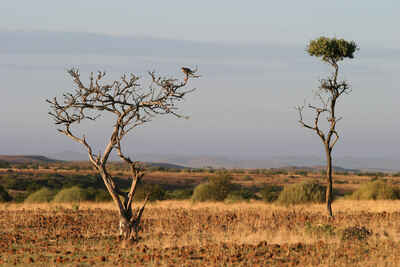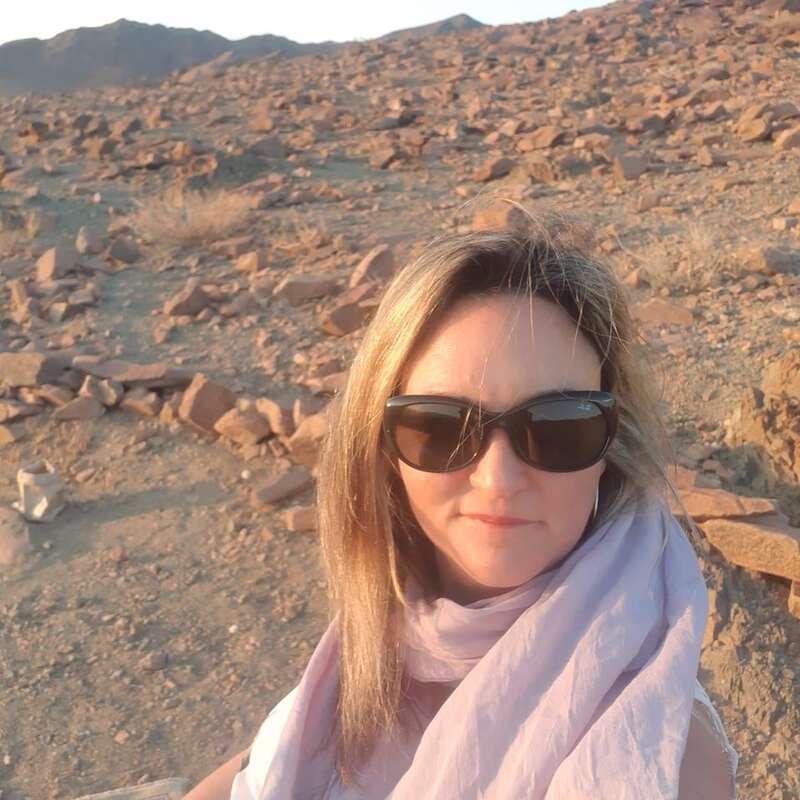About Etendeka Mountain Camp
Etendeka Mountain Camp is a small, rustic eco camp, located in a private 500km² concession area (effectively ...
... a private reserve) in the foothills of the Grootberg massif. It’s an area of stunning scenery amidst the ancient Etendeka lava flows of northern Damaraland. Here the basalt rock has been slowly eroded over millennia, leaving scattered boulders lying upon dramatic flat-topped mountains. One of the first 'real' safari camps in Namibia, Etendeka opened around 1991 and has been run since then by Dennis Liebenberg, ably assisted by his wife Claire and head guide, Bonny.
Etendeka is relatively simple by the standards of modern safari camps, and is exceptional in being owner-run for more than two decades – a major achievement. What's even more impressive is that Dennis and Bonny have retained their enthusiasm, and still manage to make sure that their guests have a really individual experience. Etendeka's fairly small size, communal dining and simple but excellent home-cooked food combine to make this a friendly and relaxed camp. It will appeal strongly to those who love solitude, great scenery and walking – while the wildlife that is increasingly visible here comes as a real bonus!
Our view
Etendeka is relatively simple by the standards of modern safari camps, and is exceptional in being owner-run for more than two decades – a major achievement. What's even more impressive is that Dennis and Bonny have retained their enthusiasm, and still manage to make sure that their guests have a really individual experience. Etendeka's fairly small size, communal dining and simple but excellent home-cooked food combine to make this a friendly and relaxed camp. It will appeal strongly to those who love solitude, great scenery and walking – while the wildlife that is increasingly visible here comes as a real bonus!
Accommodation
10 tented rooms
Children
Best for 10+
Open
Closed 6–31 January
Activities

4WD Safari

Birdwatching

Guided walking safari

Private activities
Traveller reviews of Etendeka Mountain Camp
119 real, un-edited reviews from Expert Africa's travellers.
Arrived 29 May 2025, 3 nights
"Etendeka Mountain Camp review"
Overall rating: Excellent
Arrived 14 May 2025, 2 nights
"Etendeka Mountain Camp review"
Overall rating: Excellent
Arrived 22 Aug 2024, 3 nights
"Etendeka Mountain Camp review"
Overall rating: Excellent
Arrived 18 May 2024, 2 nights
"Etendeka Mountain Camp review"
Overall rating: Good
Arrived 17 Mar 2024, 1 nights
"Etendeka Mountain Camp review"
Overall rating: Excellent
Arrived 17 Dec 2023, 2 nights
"Etendeka Mountain Camp review"
Overall rating: Excellent
Arrived 6 Oct 2022, 2 nights
"Etendeka Mountain Camp review"
Overall rating: Excellent
Arrived 20 Sep 2022, 1 nights
"Etendeka Mountain Camp review"
Overall rating: Good
Arrived 16 Mar 2022, 2 nights
"Etendeka Mountain Camp review"
Overall rating: Average
Arrived 4 Aug 2019, 2 nights
"Wonderful spot in the middle of nowhere"
Overall rating: Excellent
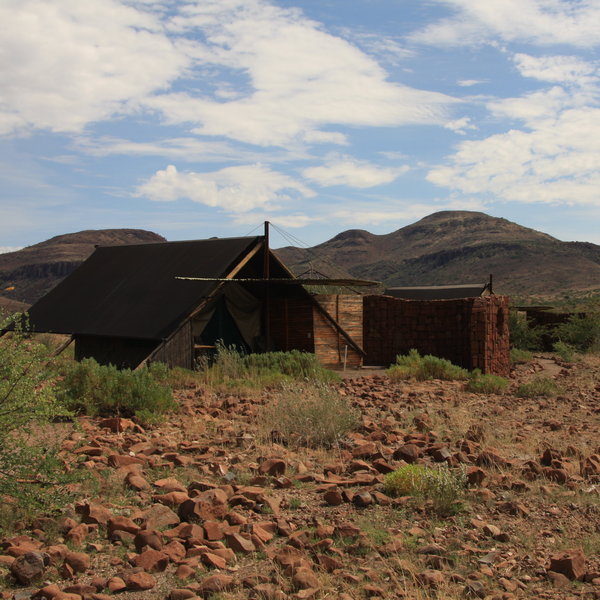
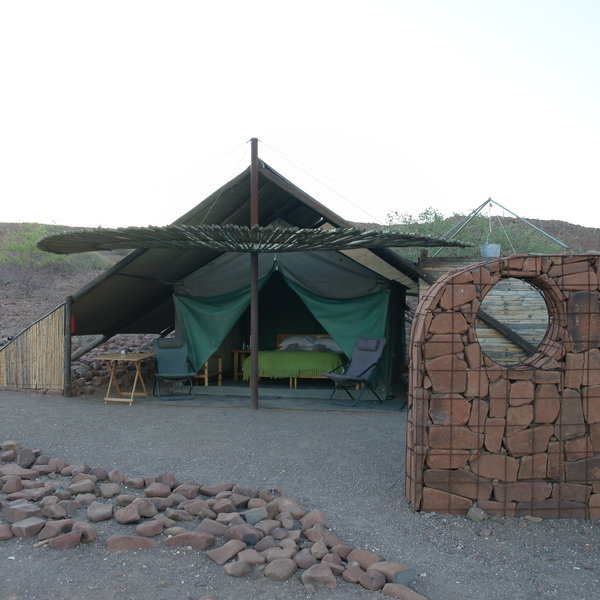
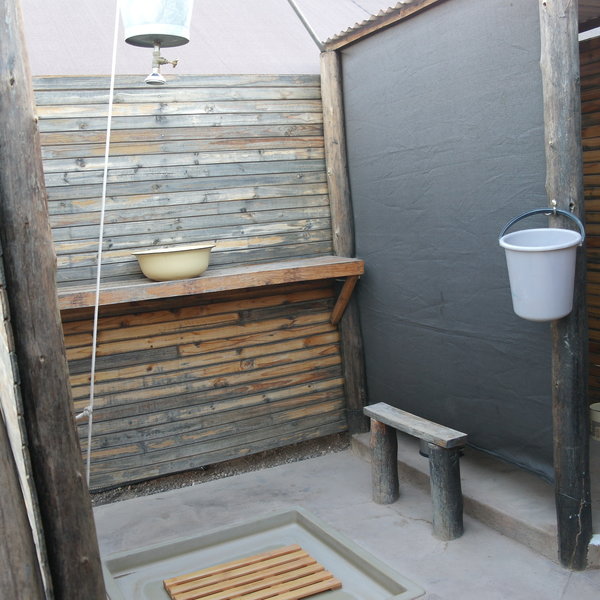
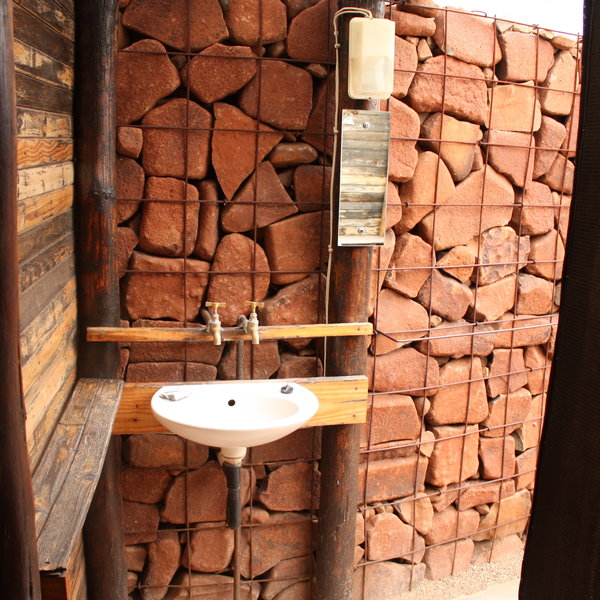
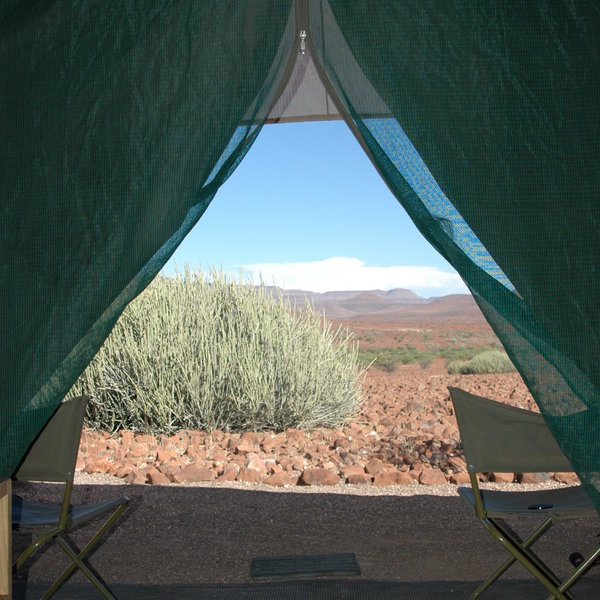
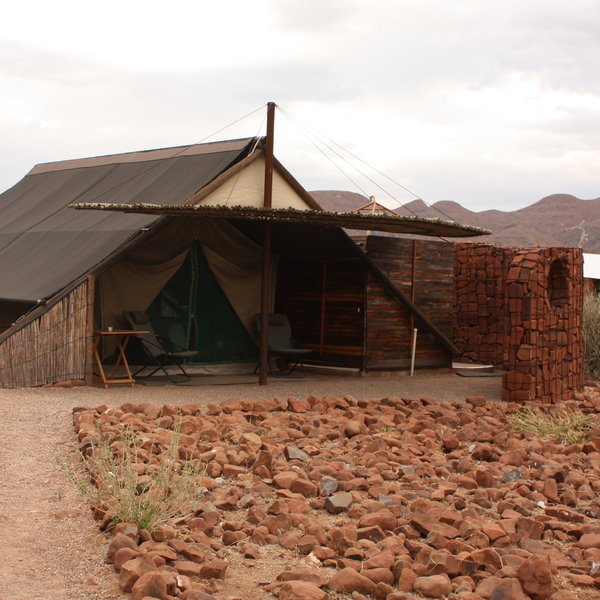
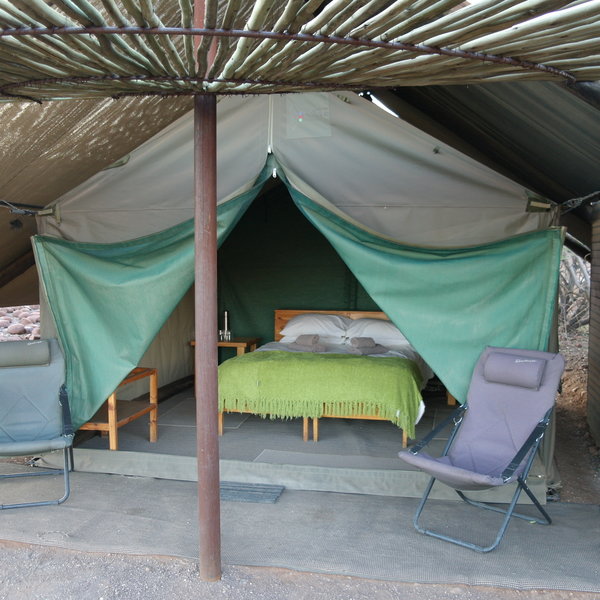
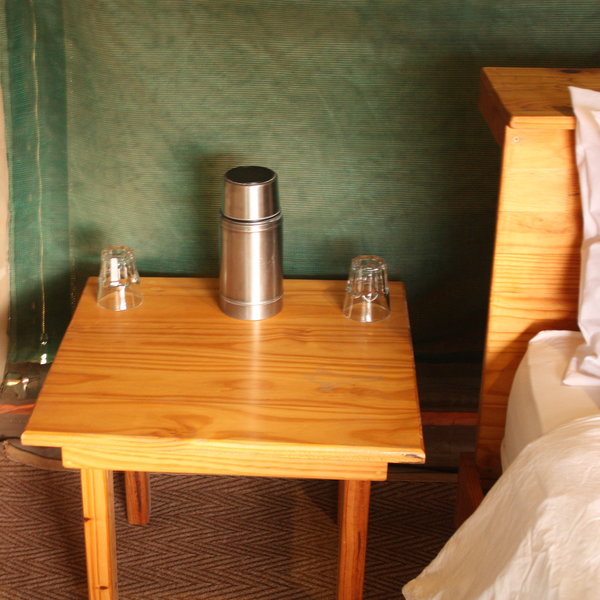
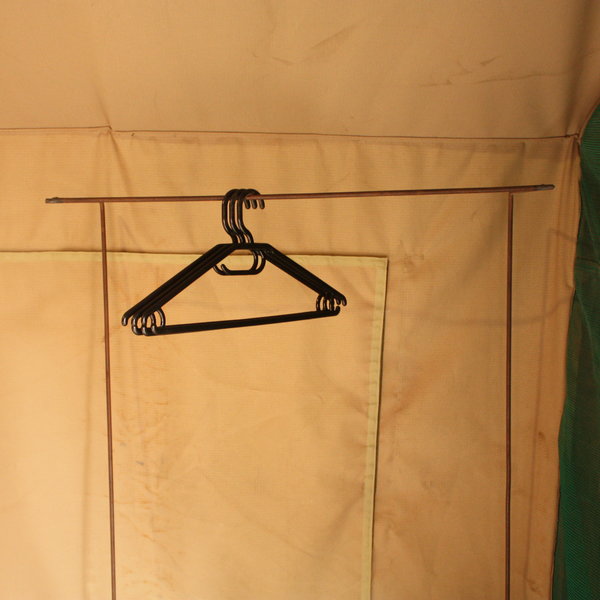
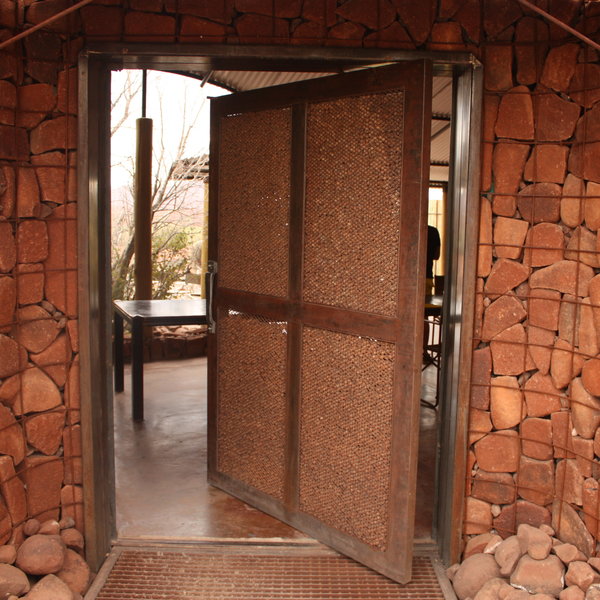
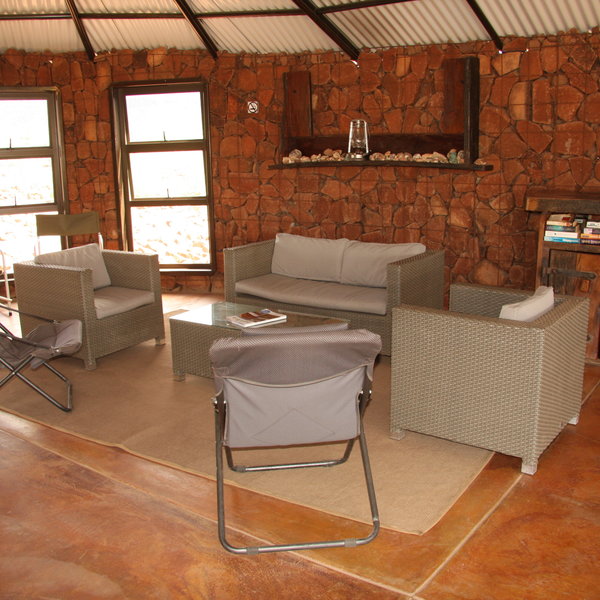
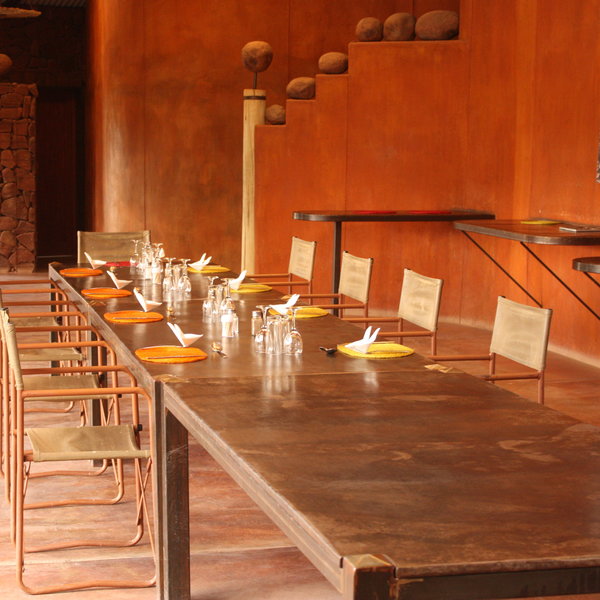
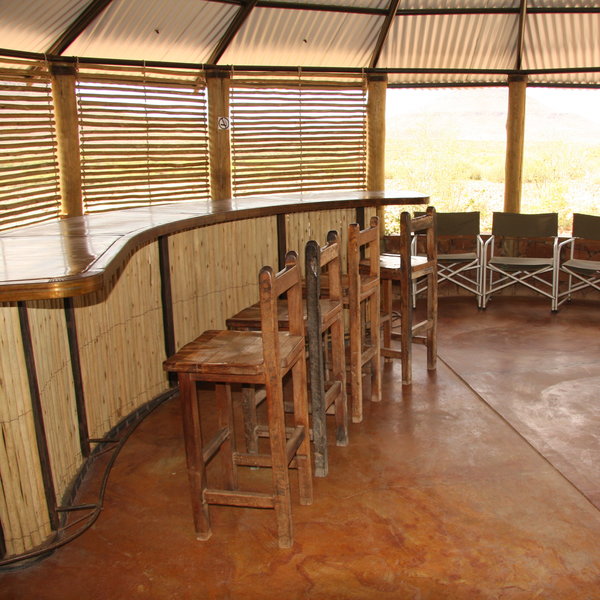
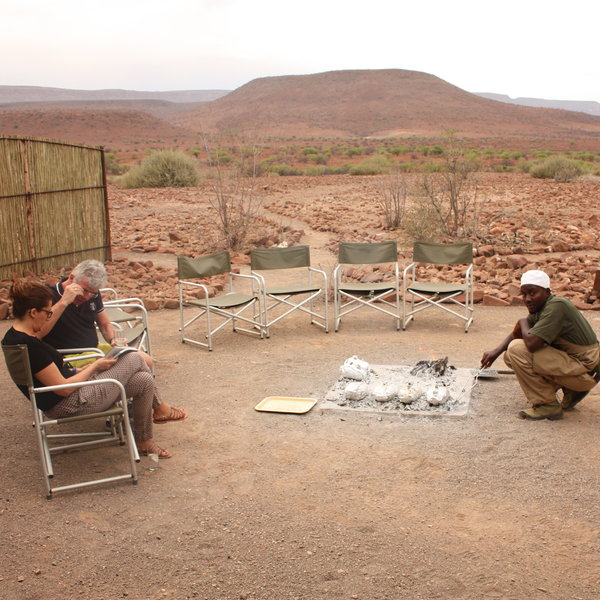
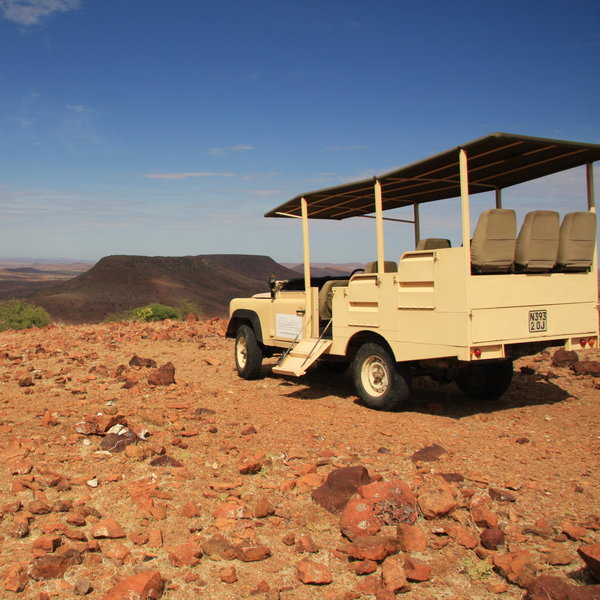
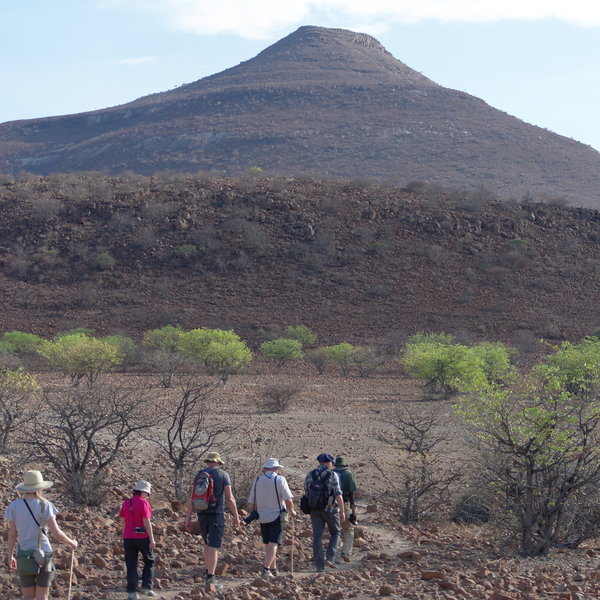
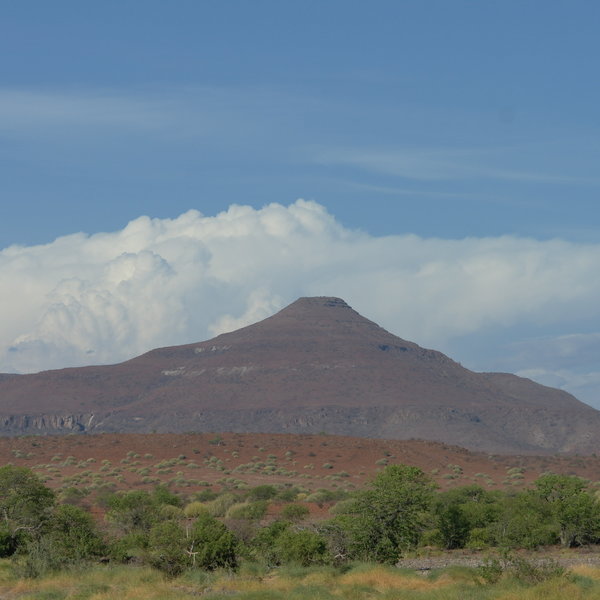
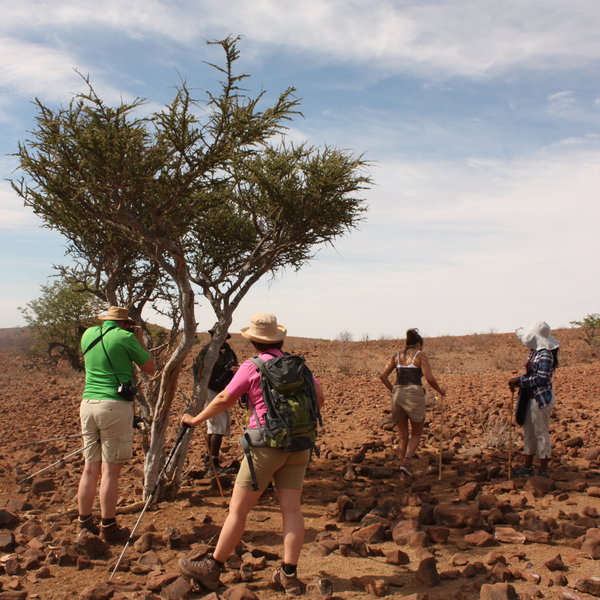
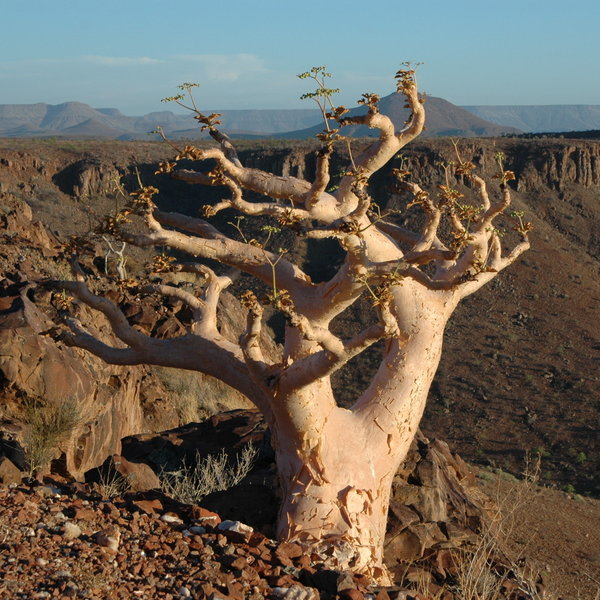
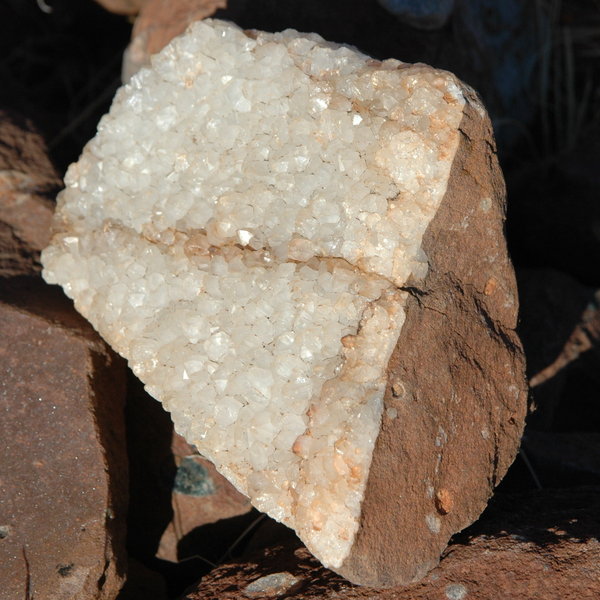
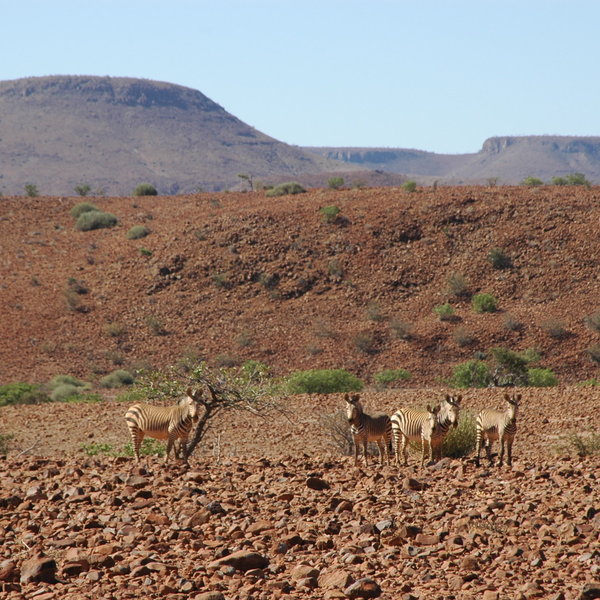
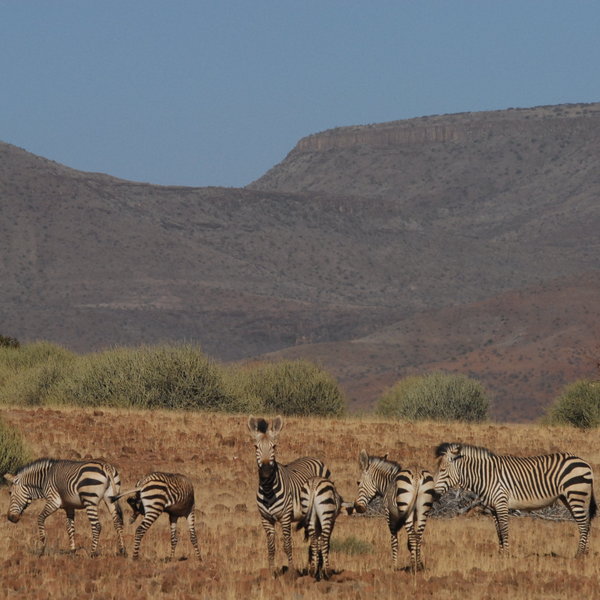
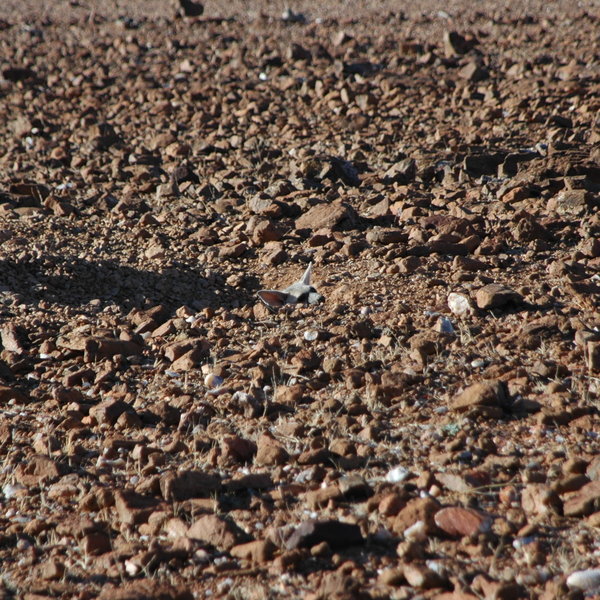
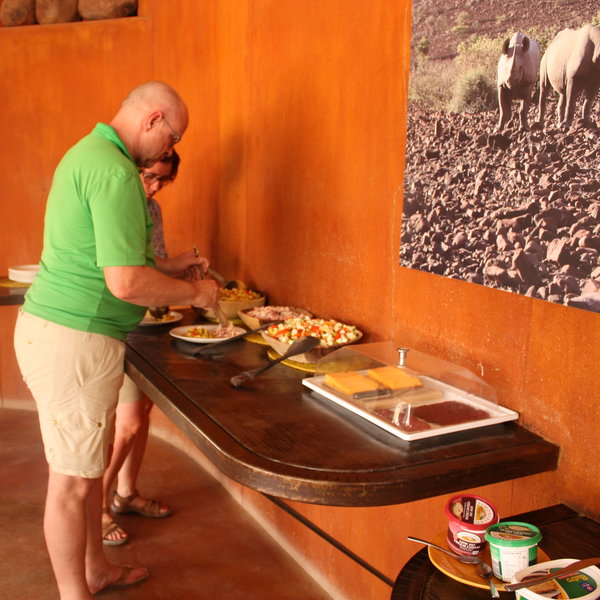
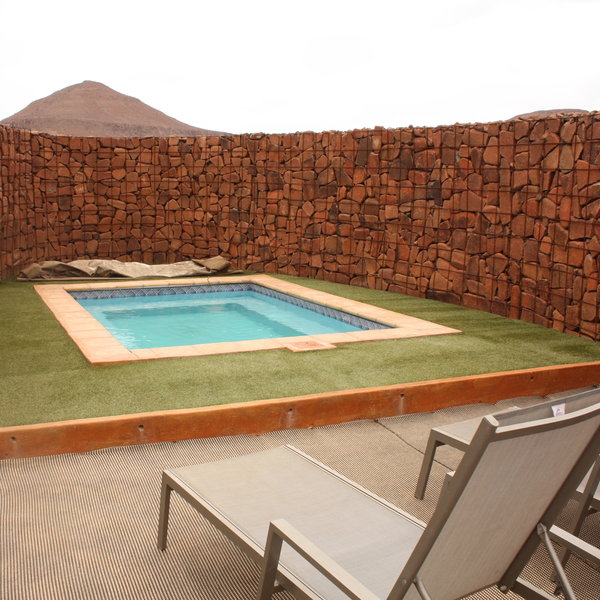
Expert Africa's gallery
When we travel we take lots of photos ourselves to give you a real and un-edited view of the safaris. See our 45 pictures and 1 videos of Etendeka Camp to get the candid view.
View galleryEtendeka Mountain Camp: Our full report
Etendeka Mountain Camp is a small, rustic eco camp, located in a private 500km² concession area (effectively ...
... a private reserve) in the foothills of the Grootberg massif. It’s an area of stunning scenery amidst the ancient Etendeka lava flows of northern Damaraland. Here the basalt rock has been slowly eroded over millennia, leaving scattered boulders lying upon dramatic flat-topped mountains. One of the first 'real' safari camps in Namibia, Etendeka opened around 1991 and has been run since then by Dennis Liebenberg, ably assisted by his wife Claire and head guide, Bonny.
Etendeka Camp has ten walk-in tents under canvas roofs, with a couple of chairs and a table at the front. All are relatively simple, furnished with twin beds, a small table, a table lamp, two luggage racks and a metal clothes rail. Next to the tent, but not en-suite, the bathroom is open to the sky, but enclosed at the sides. Here you'll find a washbasin with hot and cold running water, a fun and surprisingly good bucket shower, a flush toilet and electric lights. A curved stone wall beside each tent adds some privacy from the neighbouring tents.
Sandy pathways wind from the tents to the camp's modern, spacious but minimalist main area. This is open-fronted, with walls built out of gabions, using the local stone. The open-plan lounge has modern wicker furniture and a rustic wooden cabinet containing nature books. There is also a telescope used for stargazing in the evenings with Dennis: an interesting time learning about various constellations and the universe. The dining area, whose terracotta walls are hung with large prints of photos taken in the vicinity, has a long table surrounded by directors' chairs and a bar tucked in the corner. This is where Etendeka 's guests congregate for afternoon tea, sundowners around the campfire, and meals.
The camp also has a swimming pool, complete with a faux-grass surround and sunloungers. The pool is enclosed on three sides by stone gabion walls, so it is sheltered from the wind and is also fairly secluded.
The guiding at Etendeka is excellent. Dennis, Bonny and Boas know this part of Damaraland like the back of their hands and are passionate about the area, the geology and the wildlife that inhabit this harsh landscape. They will often share all sorts of facts about the local environment as well as about Namibian history and sociology.
Activities from the camp are included in the rates – and focus on nature drives and guided walks, at which Etendeka excels. The area's geology is especially interesting, and travelling on foot can be fascinating. The 'Quartz Walk' is littered with amazing quartz and agates – although the guides are strict that these are for viewing only!
It's worth noting, though, that there isn't much flexibility with activities. While there are four vehicles there are a maximum of three guides at Etendeka.
Etendeka isn't a place to come just for the game; it's better to treat wildlife sightings as an added bonus. The reserve has good populations of Hartmann's mountain zebra, oryx, springbok and giraffe, as well as occasional desert-adapted elephant, and very occasionally even black rhino, lion and leopard. On our last visit in November 2016, we had good sightings of springbok, oryx, impala, jackal (including pups) and to our delight elephant during our transfer into camp, which takes about one-and-a-half hours. During our nature drive we were also lucky enough to see one of the area’s black rhino with her calf in tow, although they were a way off in the distance. We also enjoyed a morning walk with Boas and were fascinated by his knowledge of the surrounding area.
Etendeka Mountain Camp is particularly conscious of their environmental impact, cooking meals over a fire and using alternative energy sources such as solar power. The staff also takes great care to remove any litter and rubbish from the area.
Activities
4WD Safari
Birdwatching
Guided walking safari
Private activities
Families & children
- Attitude towards children
- Etendeka welcomes children of eight years and upwards.
- Property’s age restrictions
- No children under eight years
- Special activities & services
- None
- Equipment
- None
- Generally recommended for children
- Etendeka is recommended for older children from about 10 years, who are keen on exploration and wildlife (great and small), and capable of managing long walks.
- Notes
- The camp is not fenced and wildlife often wanders through camp. Parents need to supervise their children at all times
Food & drink
- Usual board basis
- Full Board & Activities
- Food quality
- Meals at Etendeka focus on good, wholesome, home-prepared food, which we very much enjoyed on our most recent visit in November 2016.
Breakfast is a self-service continental buffet, consisting of breads, cereals and yoghurts, as well as cold meats and cheeses.
Lunch is served after the morning activity at about 12.00. We helped ourselves from a buffet of salads, freshly baked bread and a selection of cold meats and cheeses.
Dinner, a two-course meal, was superb both nights of our stay. With mains of beef goulash and a hearty beef pie we ate well, and were spoiled with a dessert of apple crumble and coconut pudding. Dinner is often cooked over the campfire, as ours was on a previous visit.
Afternoon tea is also provided, as is a full bar. A small snack is provided on the morning walk. - Dining style
- Group Meals
- Dining locations
- Indoor and Outdoor Dining
- Further dining info, including room service
- No
- Drinks included
- All drinks available at Etendeka are included, except for champagne and spirits, which cost extra.
Our travellers’ wildlife sightings from Etendeka Camp
Since mid-2018, many of our travellers who stayed at Etendeka Mountain Camp have kindly recorded their wildlife sightings and shared them with us. The results are below. Click an animal to see more, and here to see more on our methodology.

92% success

91% success

82% success

30% success

20% success

18% success

10% success

0% success

0% success

0% success

0% success
Getting there
- Location
- Damaraland, Namibia
- Ideal length of stay
- 2–3 nights
- Directions
- Given Etendeka’s remote location and the long 4WD-only track to the lodge, guests staying here leave their vehicle at Palmwag Lodge, from where they are transferred to the camp by the Etendeka team. The transfer is run as a nature drive so the time taken varies depending on what you see.
- Accessible by
- Self-drive
Special interests
- Scenic walking & hiking
- Etendeka is a great base for walking in Namibia. A normal day at the camp might include a 2–4 hour walk, an afternoon game drive, and possibly a short hike up one of the area's mountains.
- See ideas for Scenic walking & hiking in Namibia
Sustainability
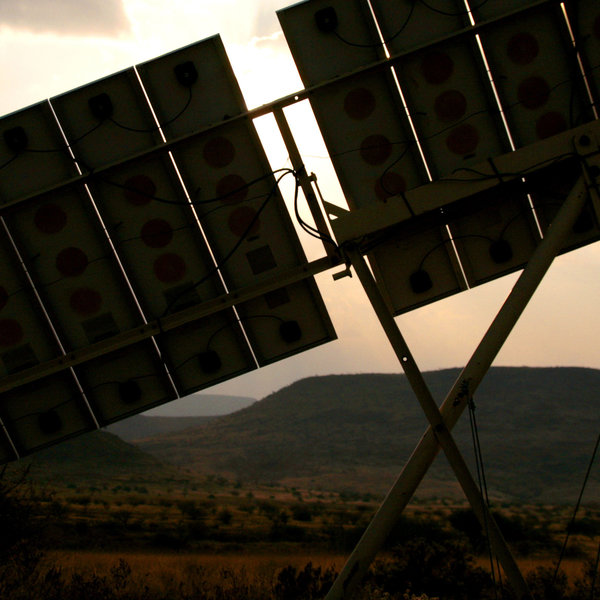
Etendeka: Protecting the environment
Comprising of 10 tented rooms, Etendeka Mountain Camp has been designed with care and respect to the environment to cause as little disturbance as possible to the pristine nature. The simplicity of the camp’s design and how innovations in water and waste management help the lodge fit well into the landscape constitute Etandeks’s most special feature.
In a semi-desert area where the average rainfall is roughly 110mm per year, Etendeka Mountain Camp uses eco-friendly open-air ‘bucket’ showers and low flush toilets. These do not only limit the water consumption, but also make guests aware of the lack of water in the region which is why they accept the system with enthusiasm. Also, the size of the swimming pool was kept at a minimum, and it only provides a place to sunbathe and cool off in the heat of the day. The pool is opened after the midday meal and closed at 4pm to minimise the use of chemicals and water.
Waste management is comparatively simple. Etendeka supports the local town of Kamanjab by doing the majority the supply shopping there. As there is no organised system for recycling in most of Namibia, on the shopping day the staff takes refuse in the form of packaging material back to town for disposal in the town rubbish dump. Also, organic material is taken to the local communal farms for feeding the chickens and making compost.
Etendeka Mountain Camp is one of the first lodges in Namibia to be assessed and achieved top score with 5 flowers awarded since 2014 by Eco Awards Namibia for its continuous hard work in protecting the environment.
See more great sustainability projects in Namibia
Communications
- Power supply notes
- There are no plug sockets in the tents, but there is a charging station in the main area for guests to use.
- Communications
- There is very patchy cellphone reception. WiFi is available in the main area.
- TV & radio
- None
- Water supply
- Borehole
- Water supply notes
- The shower is a simple bucket shower, where you fill a bucket from hot and cold taps, and then hoist it up above you. Quite fun and very effective! There is a normal flush toilet.
Health & safety
- Malarial protection recommended
- Yes
- Medical care
- Patients in need of medical assistance would be driven back to Palmwag Lodge, or in an emergency flown to Windhoek, which would take about four hours. There is an airstrip about 30 minutes’ drive from Etendeka.
Walking with an armed guide: at Expert Africa we strongly believe that when walking in an area with dangerous wildlife, it is normally important that you are accompanied by a trained and armed guide to protect you should you have a close encounter. While dangerous wildlife, such as lions, leopards, rhinos and elephants are found in the area around Etendeka, their densities are low and the terrain is generally very open. As such the chances of an unexpected encounter with these animals is very slim.
The guides at Etendeka are experienced and highly skilled, but they don't carry rifles on walking safaris. Given the circumstances, we believe that the walks here as are safe as the walking safaris that we offer elsewhere, where guides are armed; the bush is thicker; and wildlife densities are higher. However, if you have any concerns please don't hesitate to discuss them with the team at Expert Africa - and indeed to let the camp manager know that you prefer not to walk whilst you're there. - Dangerous animals
- Moderate Risk
- Security measures
- Because of the camp's isolated location, there are no security guards at Etendeka.
- Fire safety
- There are fire extinguishers just outside each tent.
Useful info
- Disabled access
- On Request
- Laundry facilities
- Laundry cannot be done at Etendeka due to the short supply of water here.
- Money
- There is no currency exchange here. There is a safe in the office if you'd like to lock valuables away.
- Accepted payment on location
- No money is required here as your stay is fully inclusive.
Plan and book your trip with Expert Africa
All of our trips are tailor-made, so we'll always adapt them to suit you. Talk to an Expert and let us plan and arrange your perfect trip.

Talk to an Expert
Call or email us now! We’ll match you with the Specialist in our team who is best suited to help you. Then together we can start planning your trip.

Set up your itinerary
Based on our experience and your ideas, your specialist will create a detailed, costed itinerary. We’ll refine it together, until we have a trip that you’re perfectly happy with.

Prepare for your trip
The same Specialist will make the seamless arrangements for your trip, send you detailed travel documents, and be available to answer any questions before you depart.

Travel with peace of mind
After you set off, you’ll be cared for by our partners in Africa, most of whom have worked with Expert Africa for decades. And if you ever need us urgently, we’re available 24/7.

When you return
We love to learn about your trip, and so will always be grateful if you’ve the time to give feedback to your Specialist when you return.
Etendeka Mountain Camp's location
Look closer at the environment and surroundings of Etendeka Camp.
Other lodges in Damaraland
Alternative places to stay in this same area.
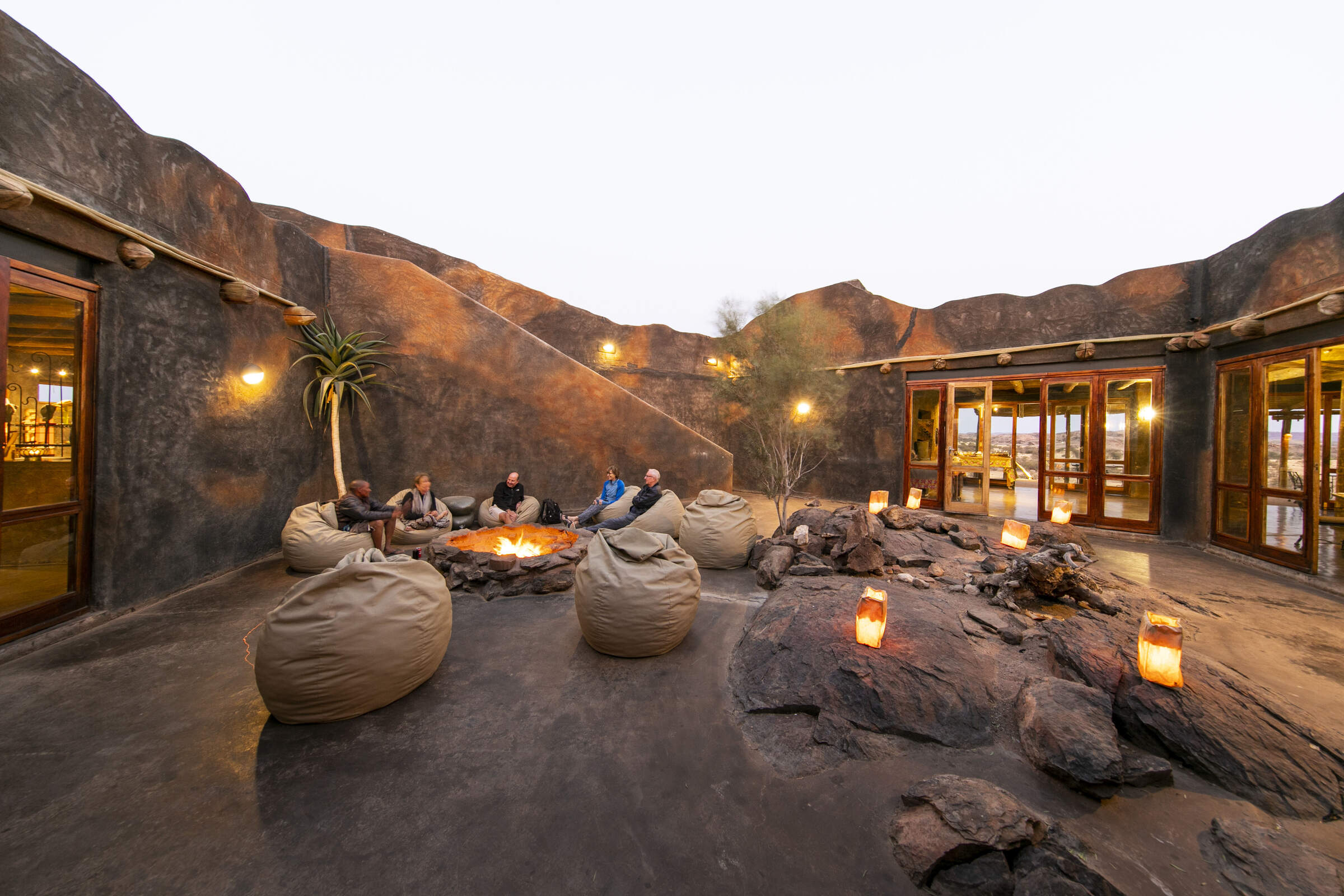
Doro Nawas
Comfortable rooms and a convenient location make the community run Doro Nawas a great base for exploring Damaraland.
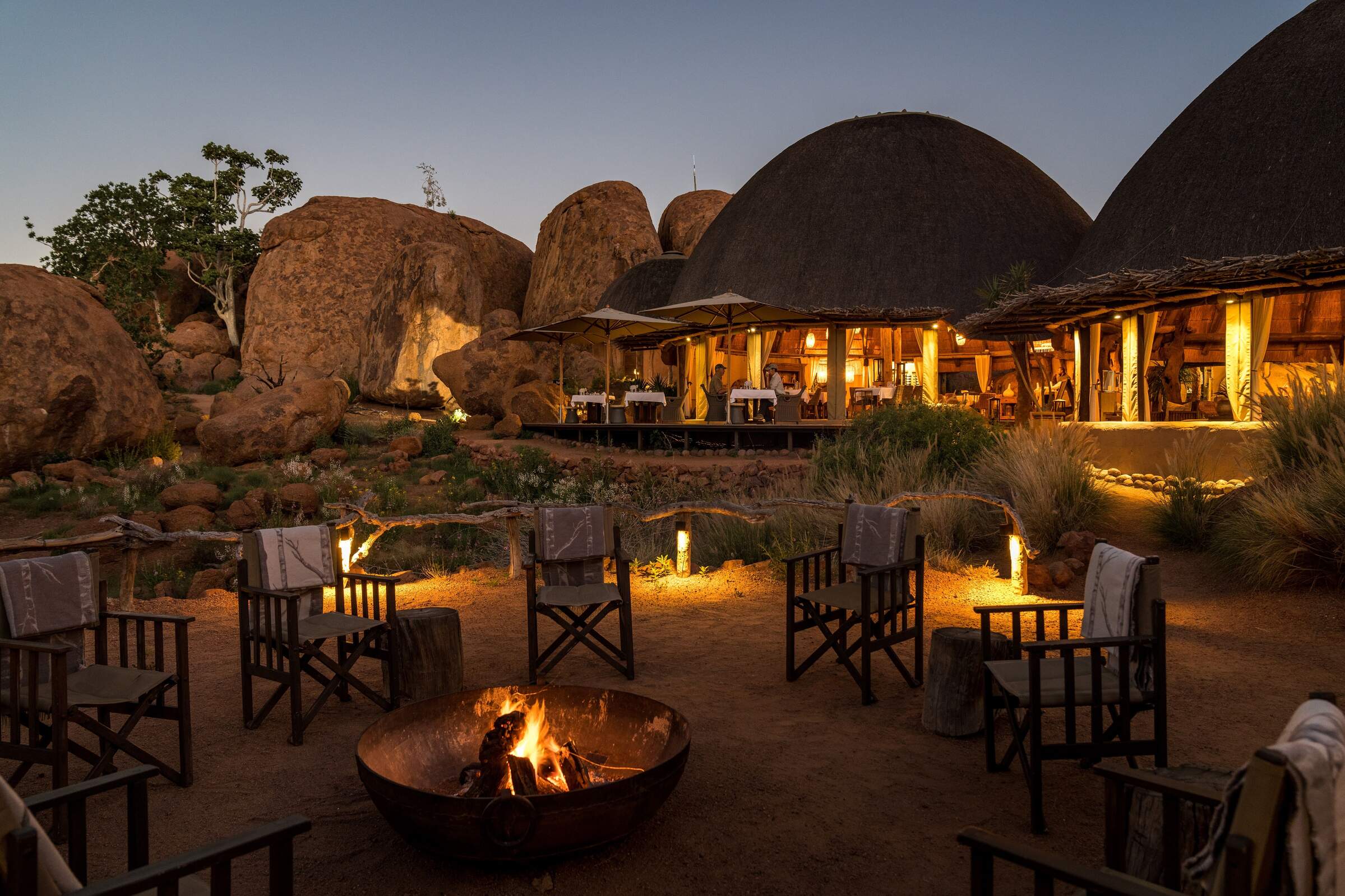
Mowani Mountain Camp
Mowani is a beautiful and stylish mountain retreat in southern Damaraland; it makes a great base for visits toTwyfelfontein.
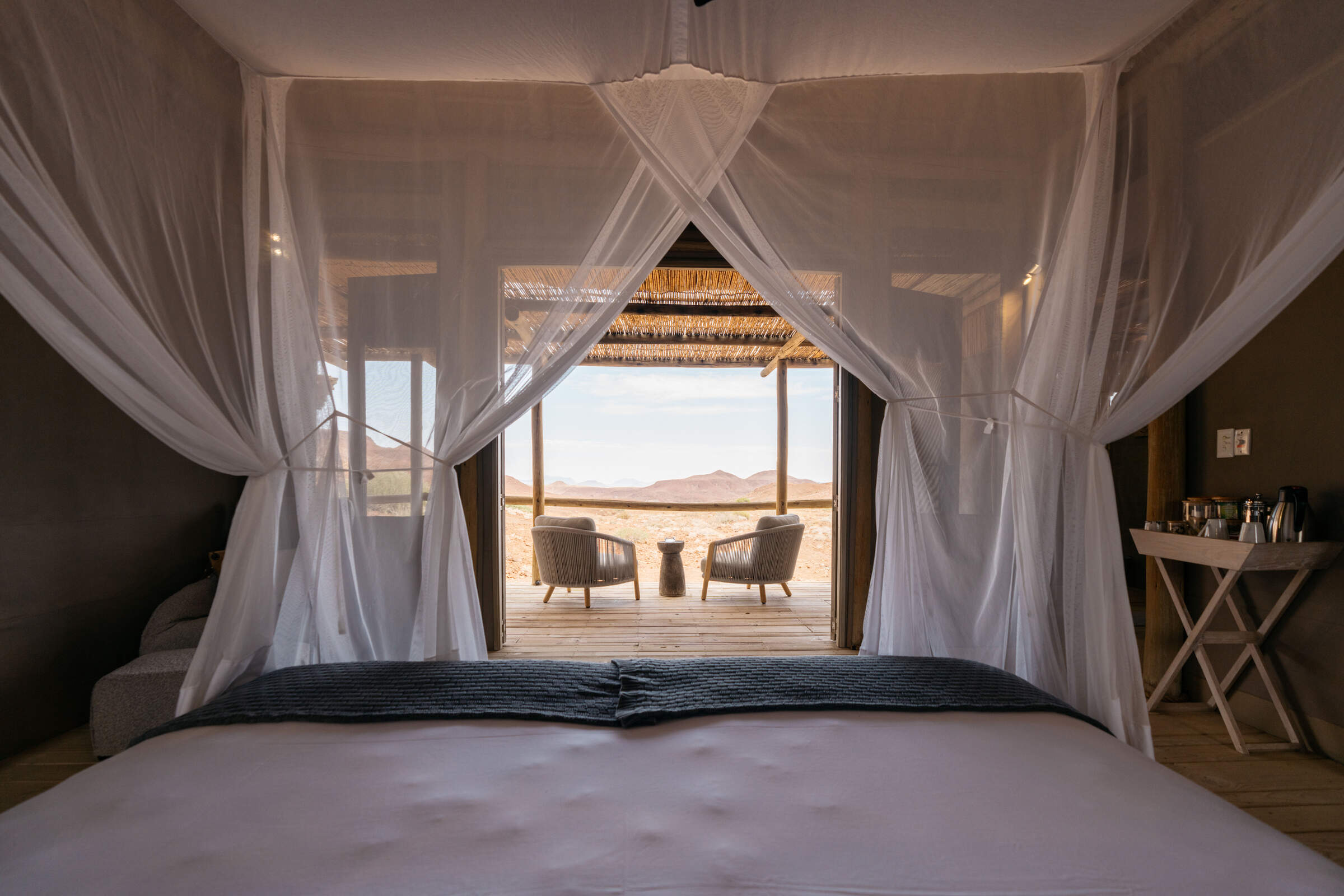
Damaraland Camp
Setting the standard for community partnerships, Damaraland Camp offers a beautiful location, a range of activities – and a genuine welcome.
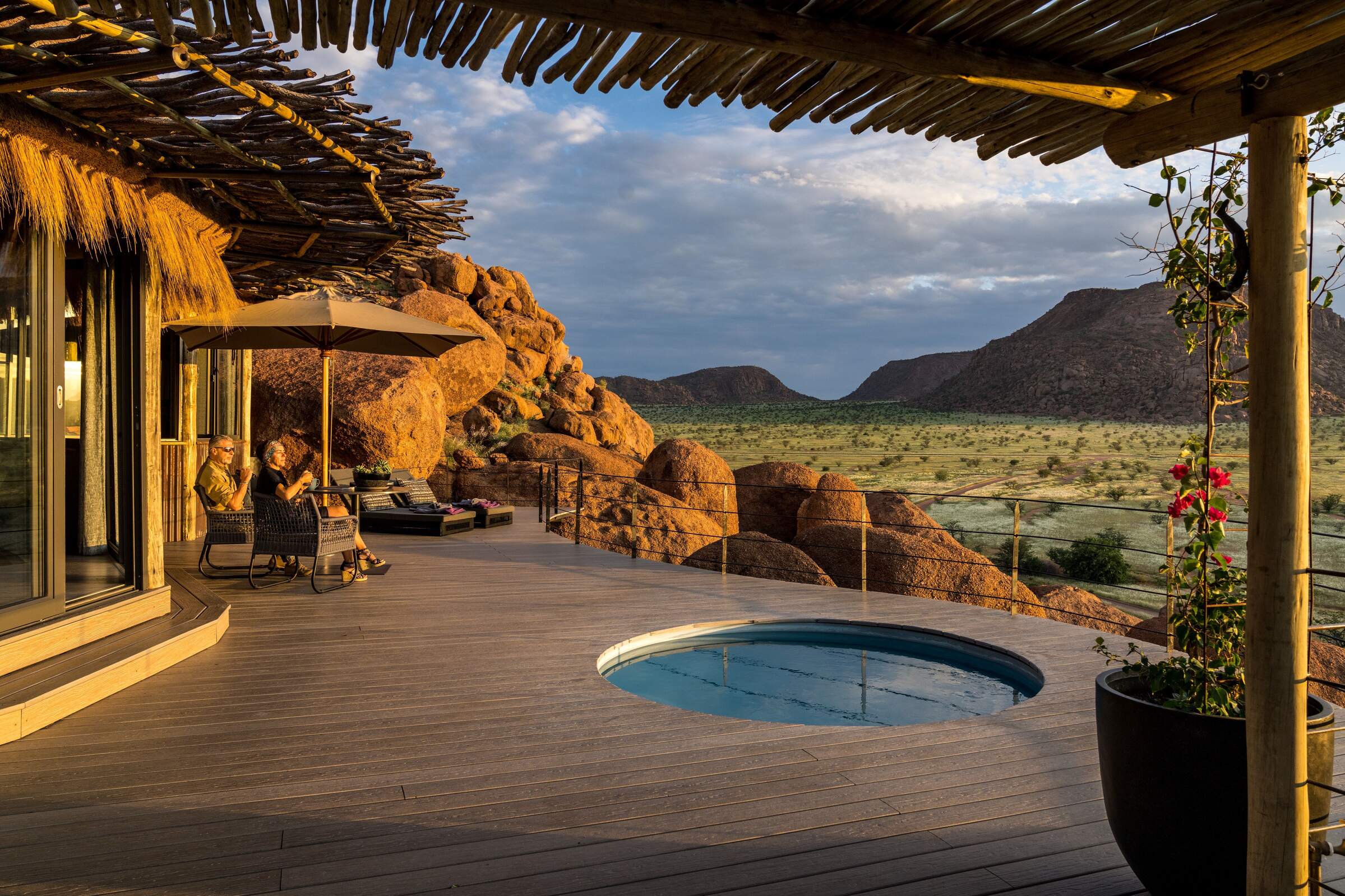
Camp Kipwe
With unusual, igloo-like rooms, open-air bathrooms and beautiful scenery, Camp Kipwe is well placed for nature and cultural excursions.
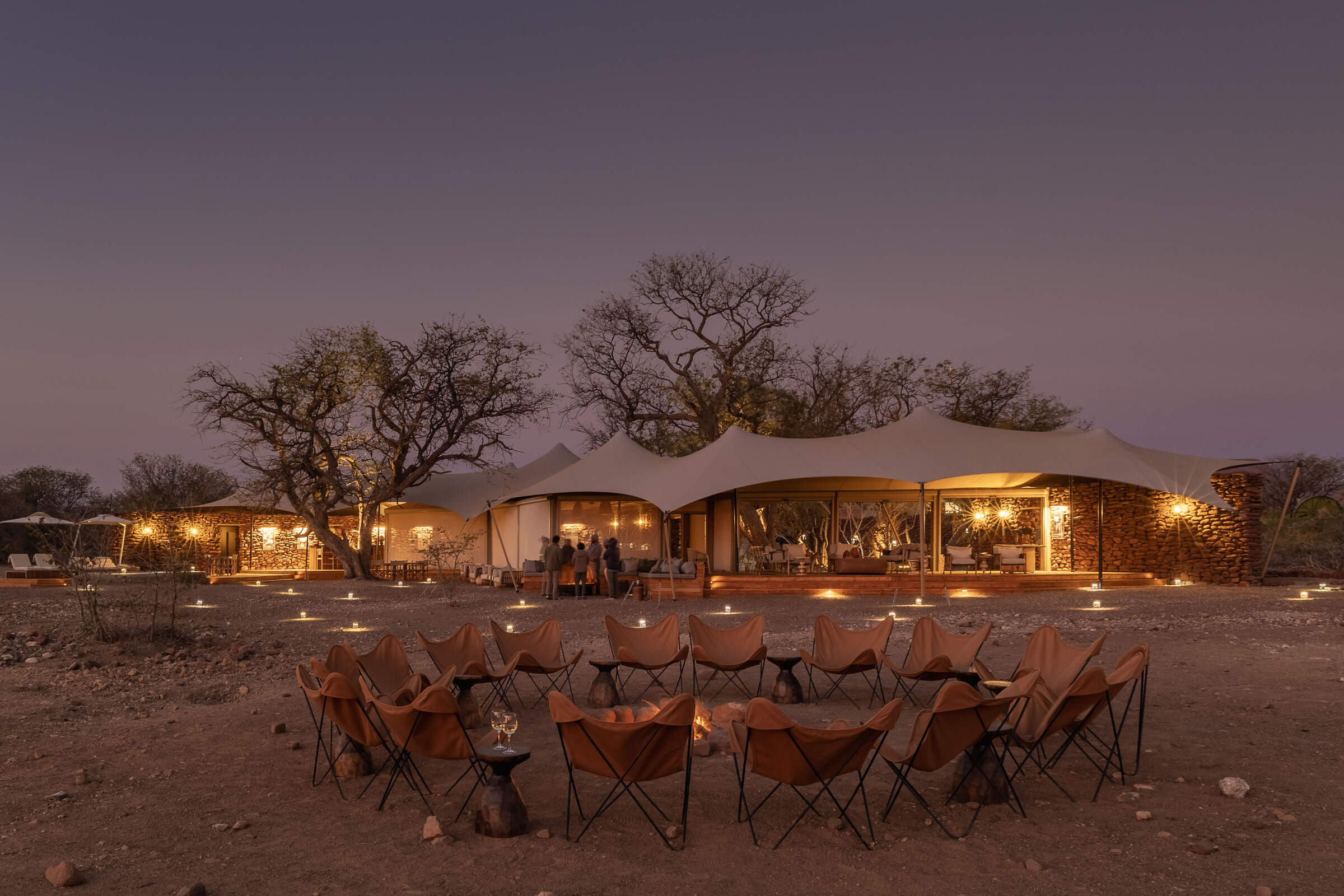
Desert Rhino Camp
Desert Rhino Camp offers a rare opportunity to track black rhino on foot in one of the last true wilderness areas – an amazing experience.
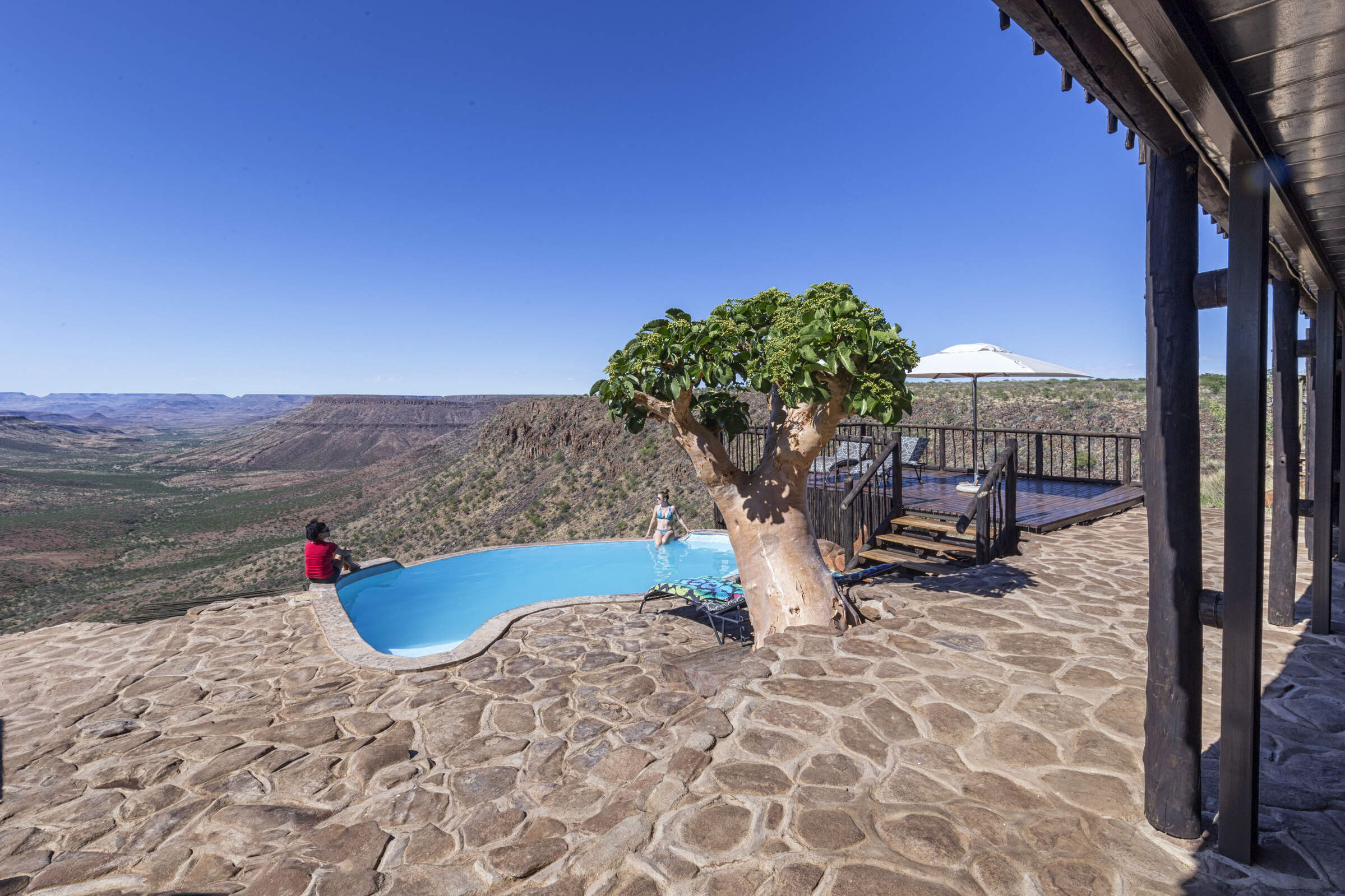
Grootberg Lodge
On the edge of an ancient plateau Grootberg Lodge has a stunning location and arguably the best views of any lodge in Namibia.
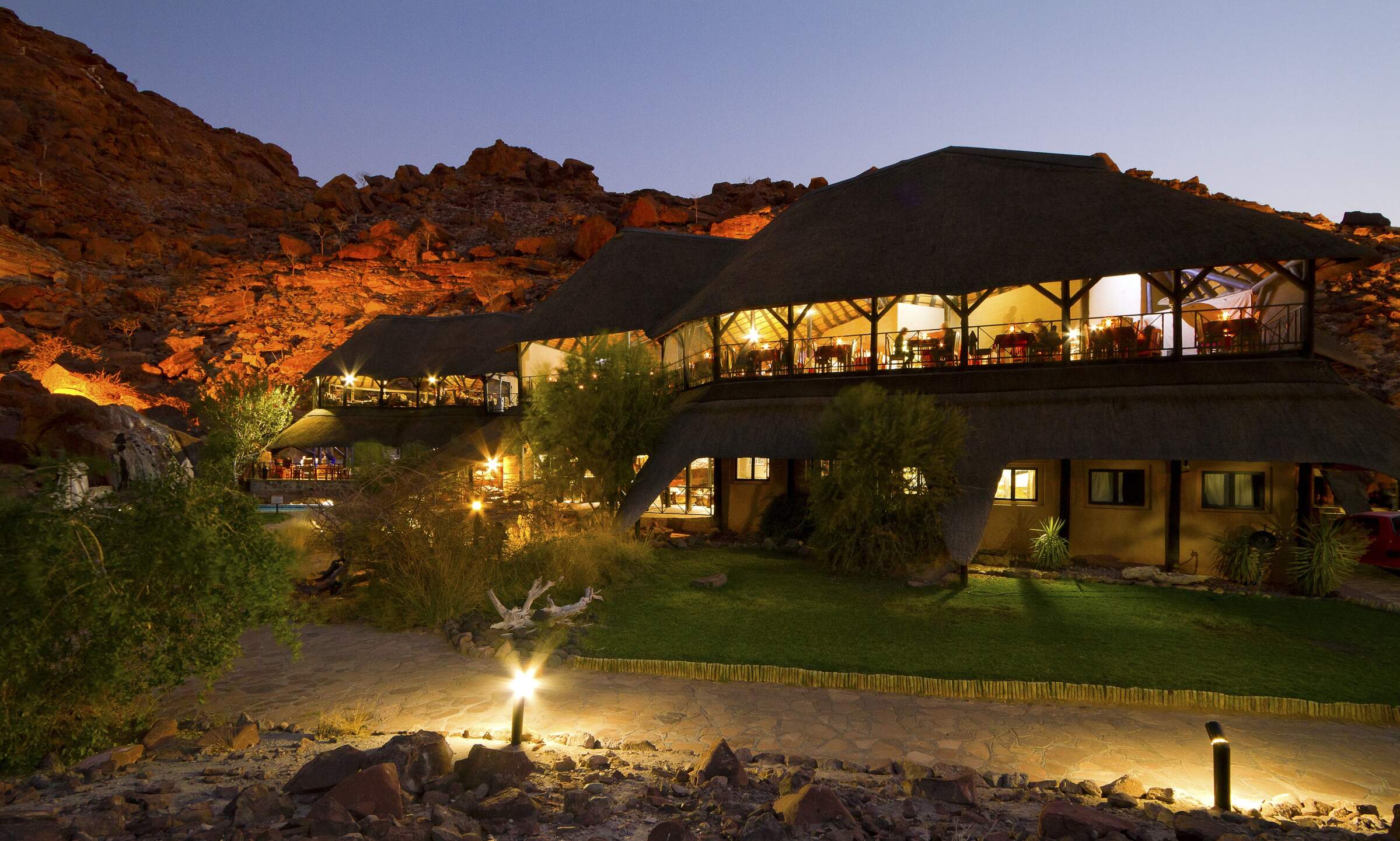
Twyfelfontein C'try Lod.
A large lodge set among the rocks, Twyfelfontein Country Lodge is a convenient base for visiting the rock engravings, which are only 4km away.
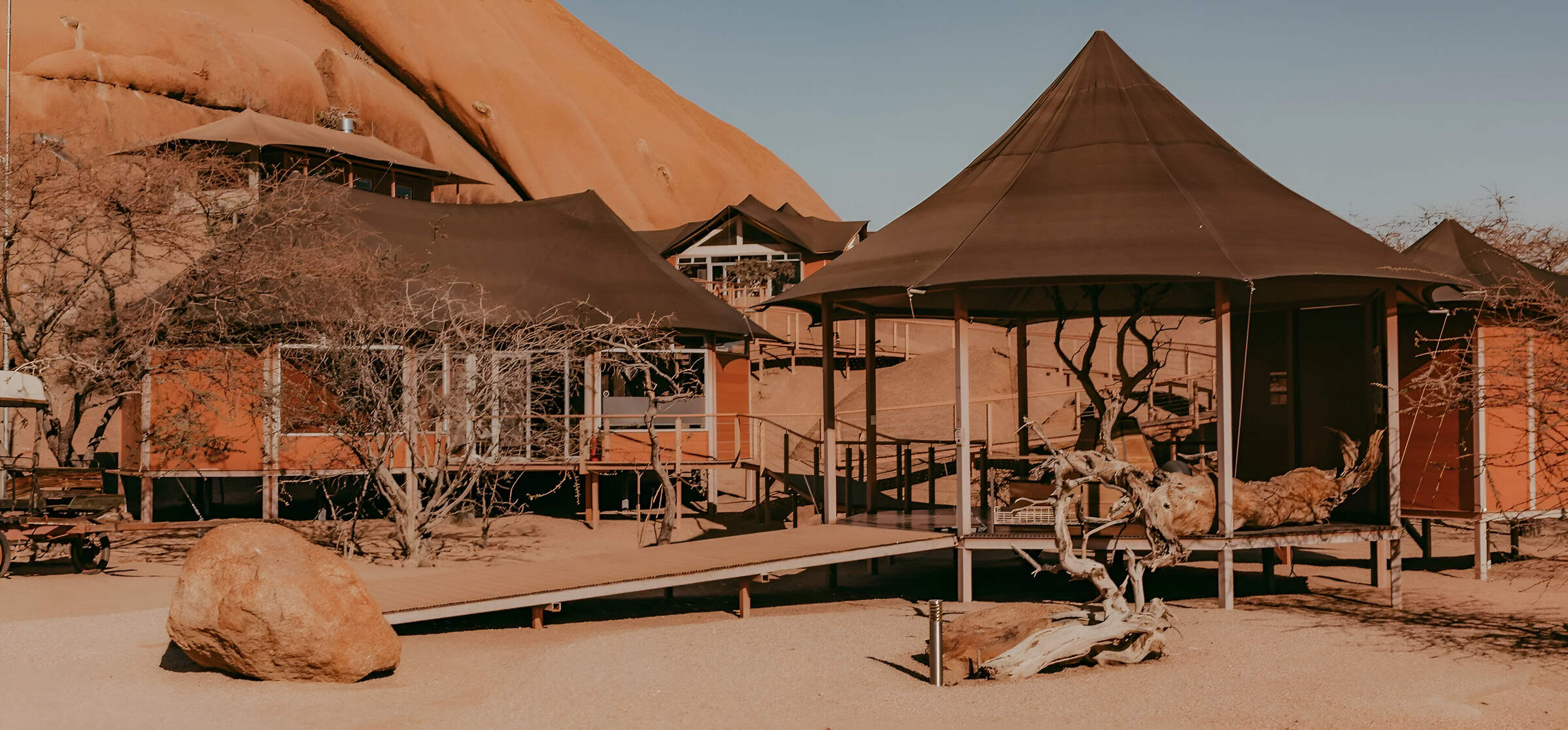
Spitzkoppen Lodge
Spitzkoppen Lodge provides stylish accommodation in an area of scenic grandeur with guided access to sites of ancient Bushman rock art.
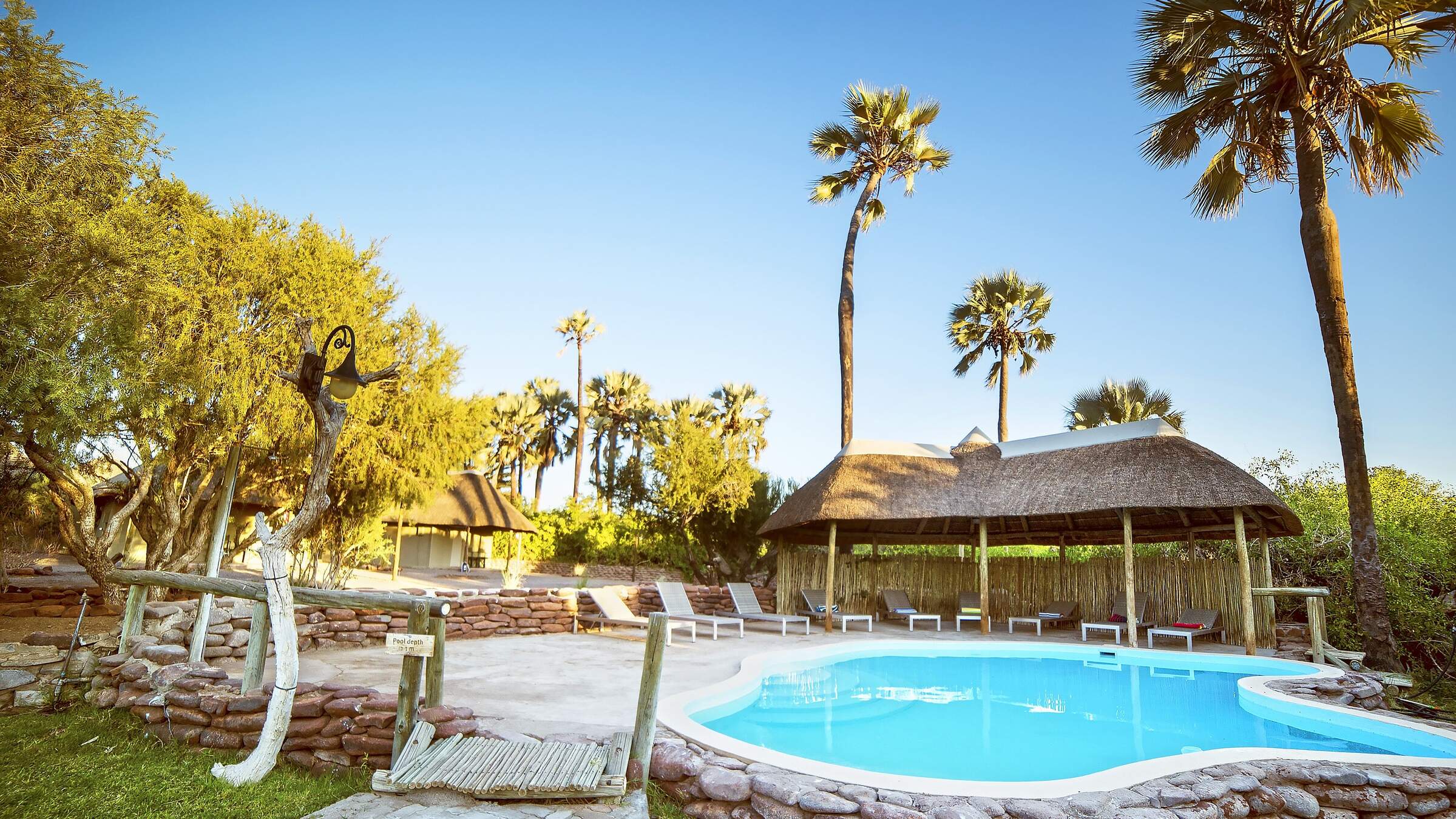
Palmwag Lodge
Palmwag Lodge has a great location by a spring in the Uniab River and offers access to an area where you can see a variety of desert-dwelling animals.
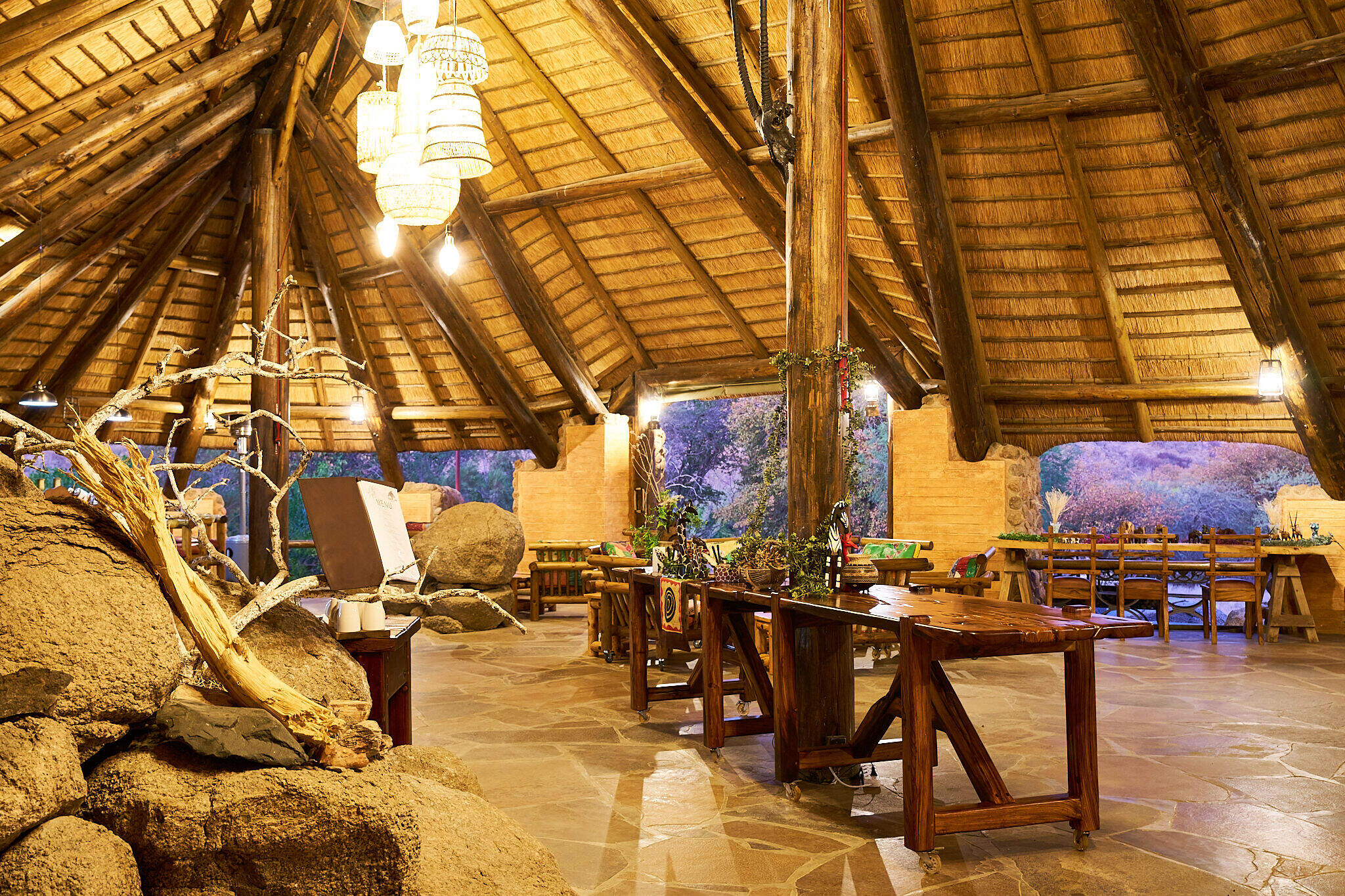
Huab Lodge
Huab is a classic little Namibian Lodge which is slightly off the beaten track in a lesser visited part of Damaraland.
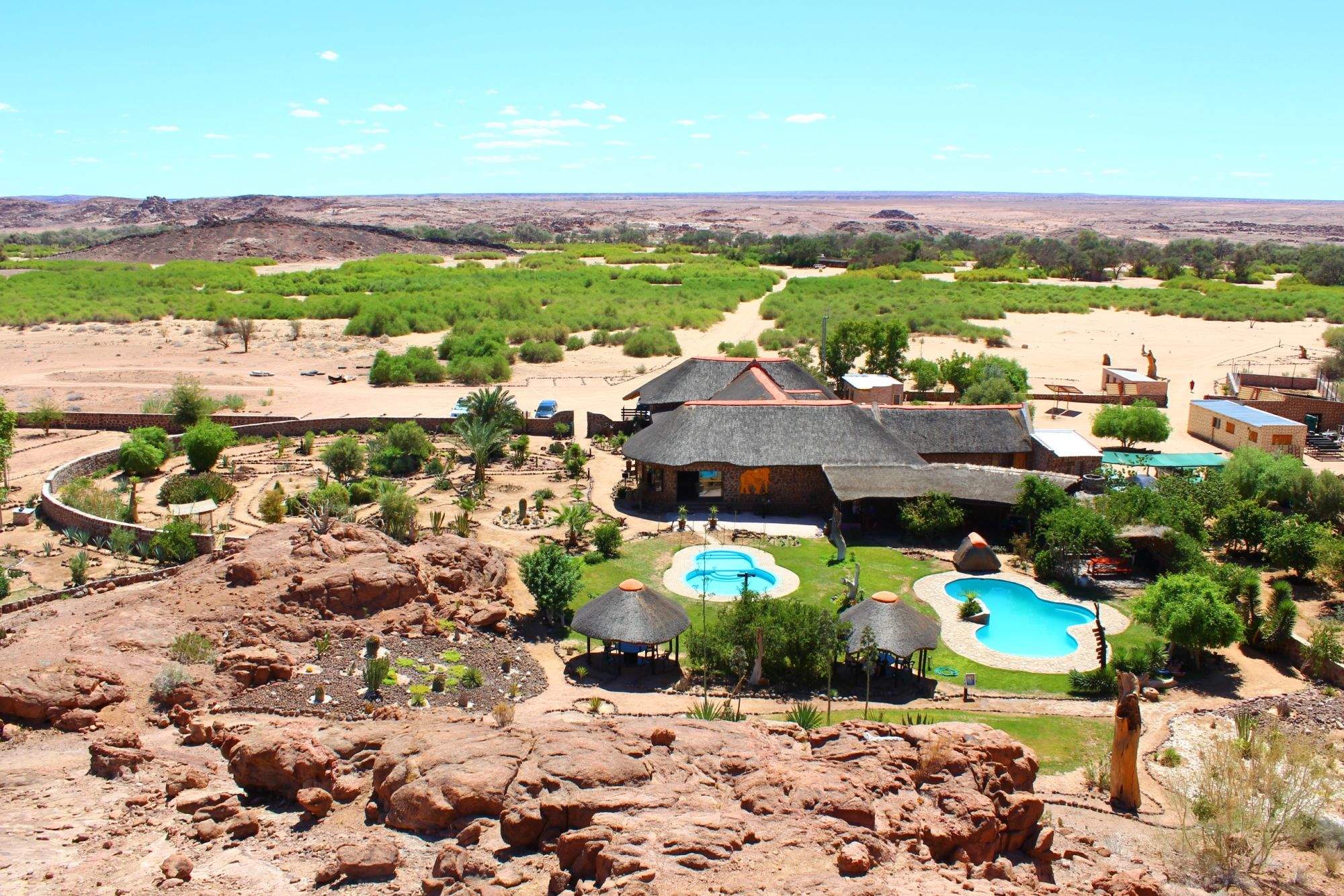
Brandberg White Lady
Brandberg White Lady Lodge, nestled at the foot of its namesake, makes a good base from which to visit bushman rock paintings including the 'White Lady'.
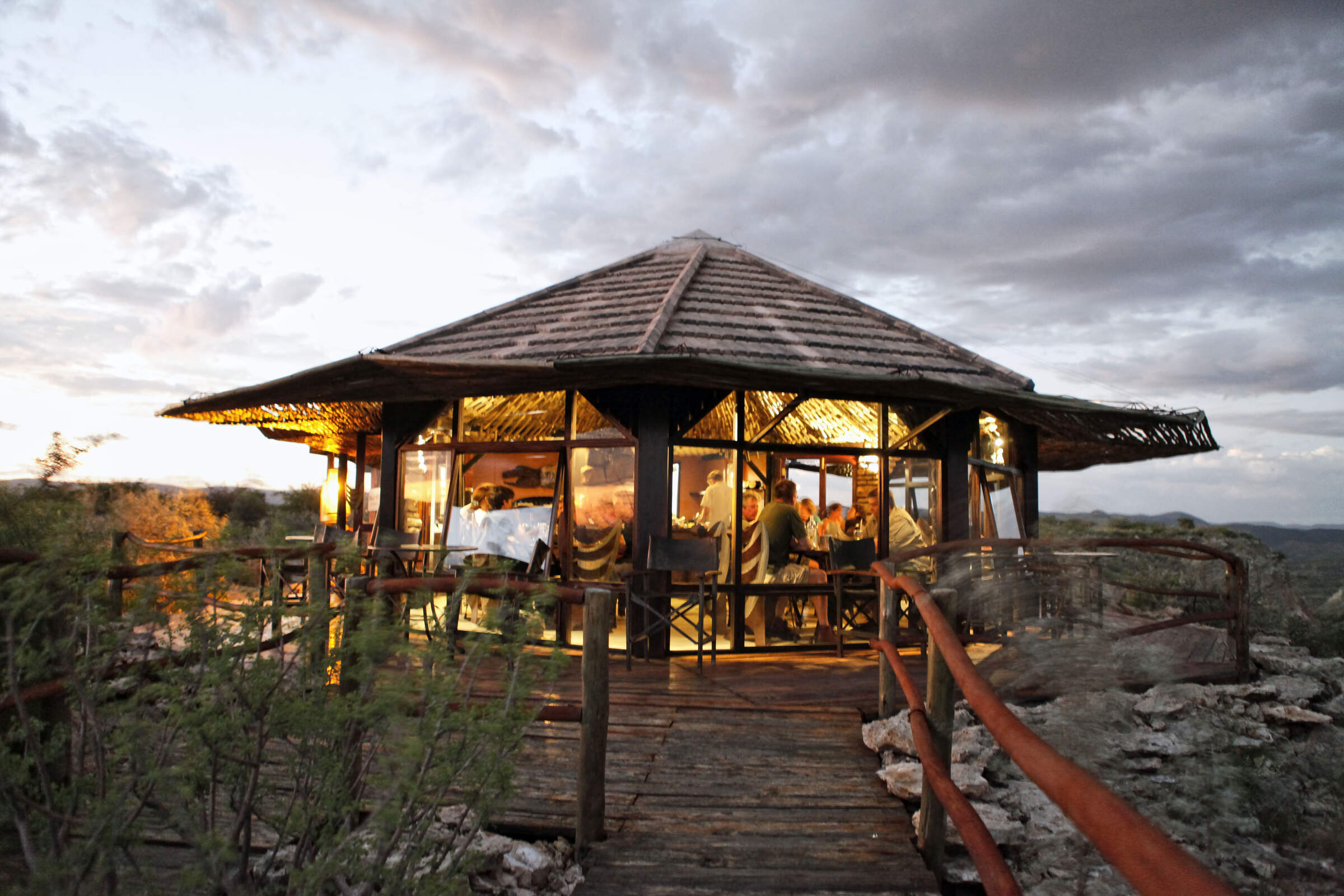
Vingerklip Lodge
Vingerklip Lodge occupies a lovely location, but is a little too far east for guests to visit Damaraland's main attractions.
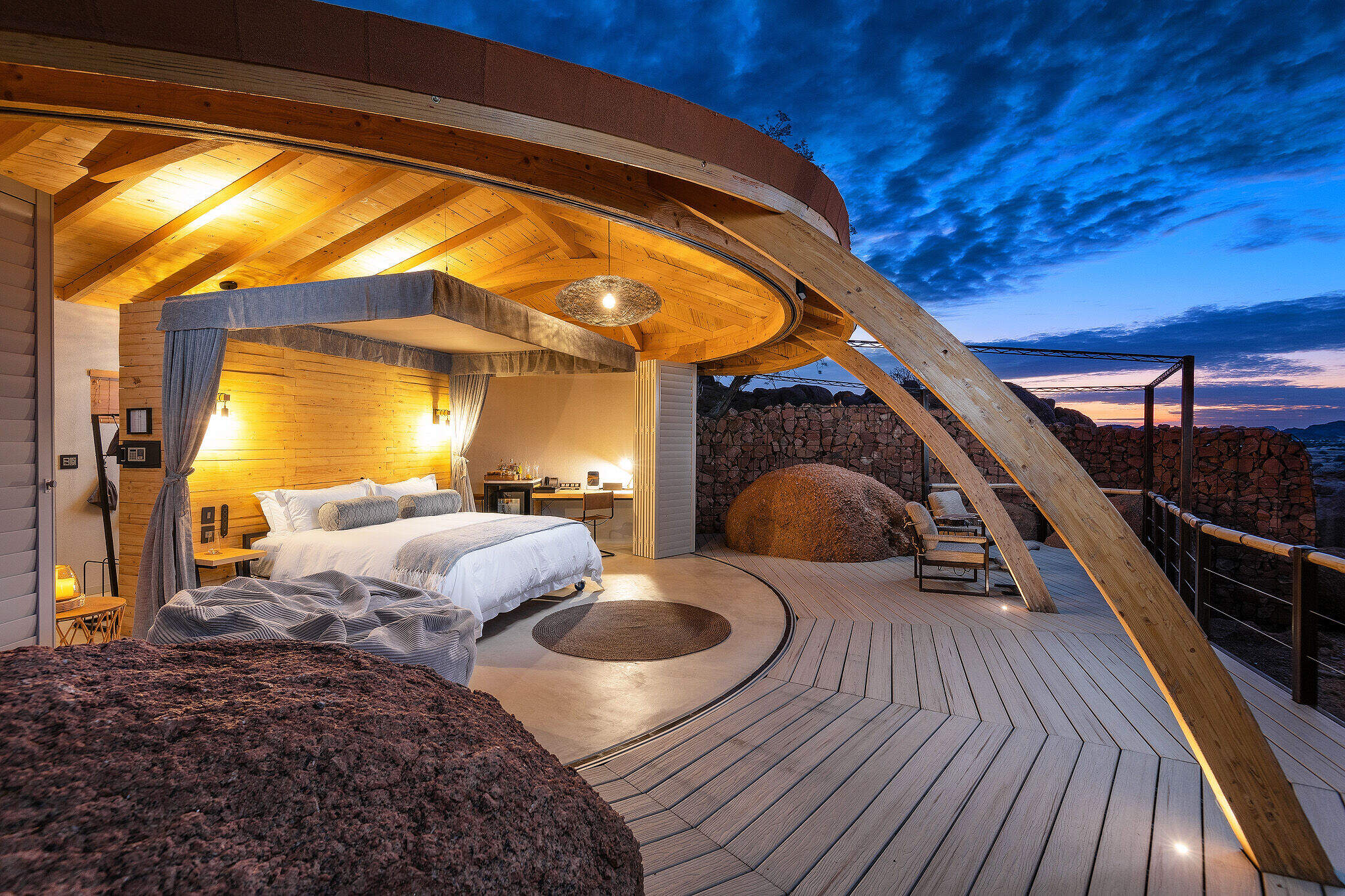
Onduli Ridge
Onduli Ridge is a luxurious, low-impact luxury camp offering top-notch guiding in a remote wilderness area of Damaraland.
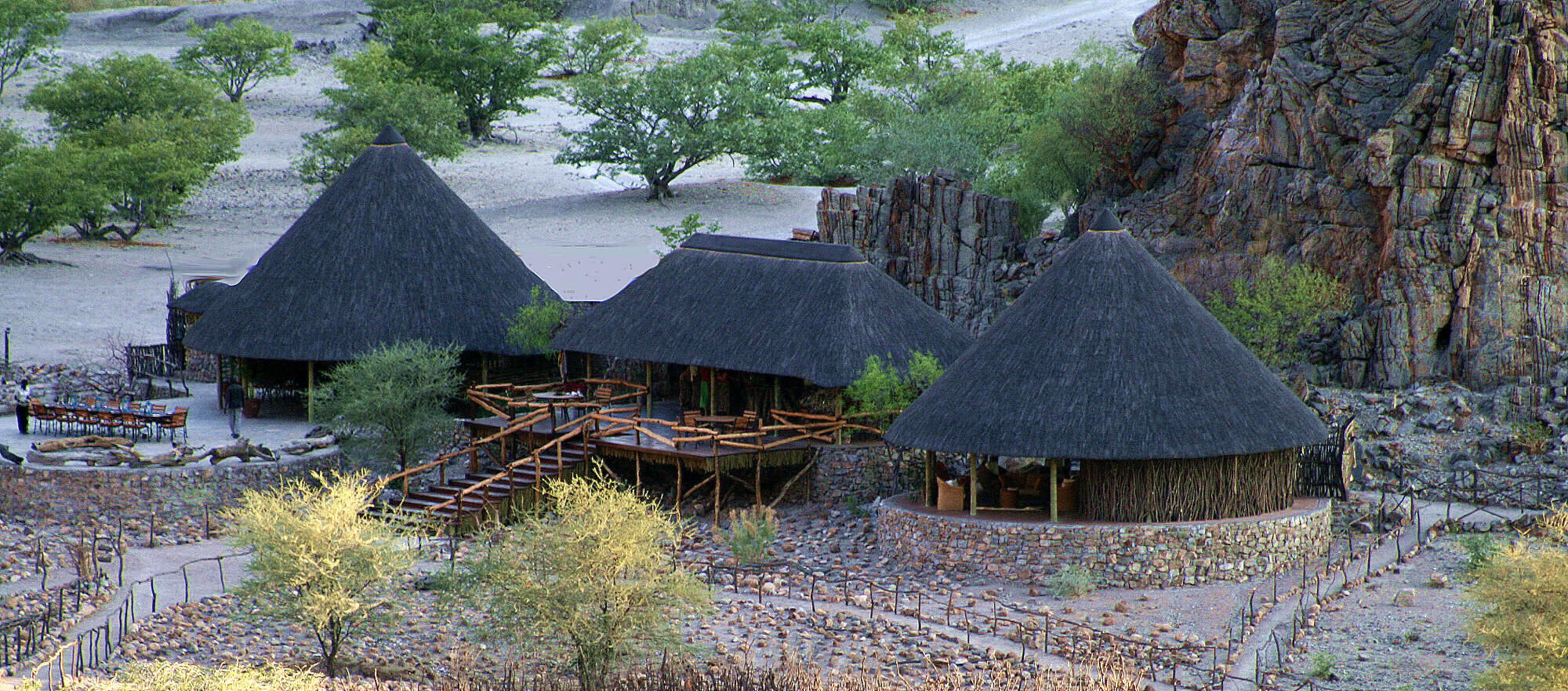
Khowarib Lodge
Khowarib Lodge has a great location overlooking the Hoanib River. This is one of the few places to offer authentic Himba village visits.
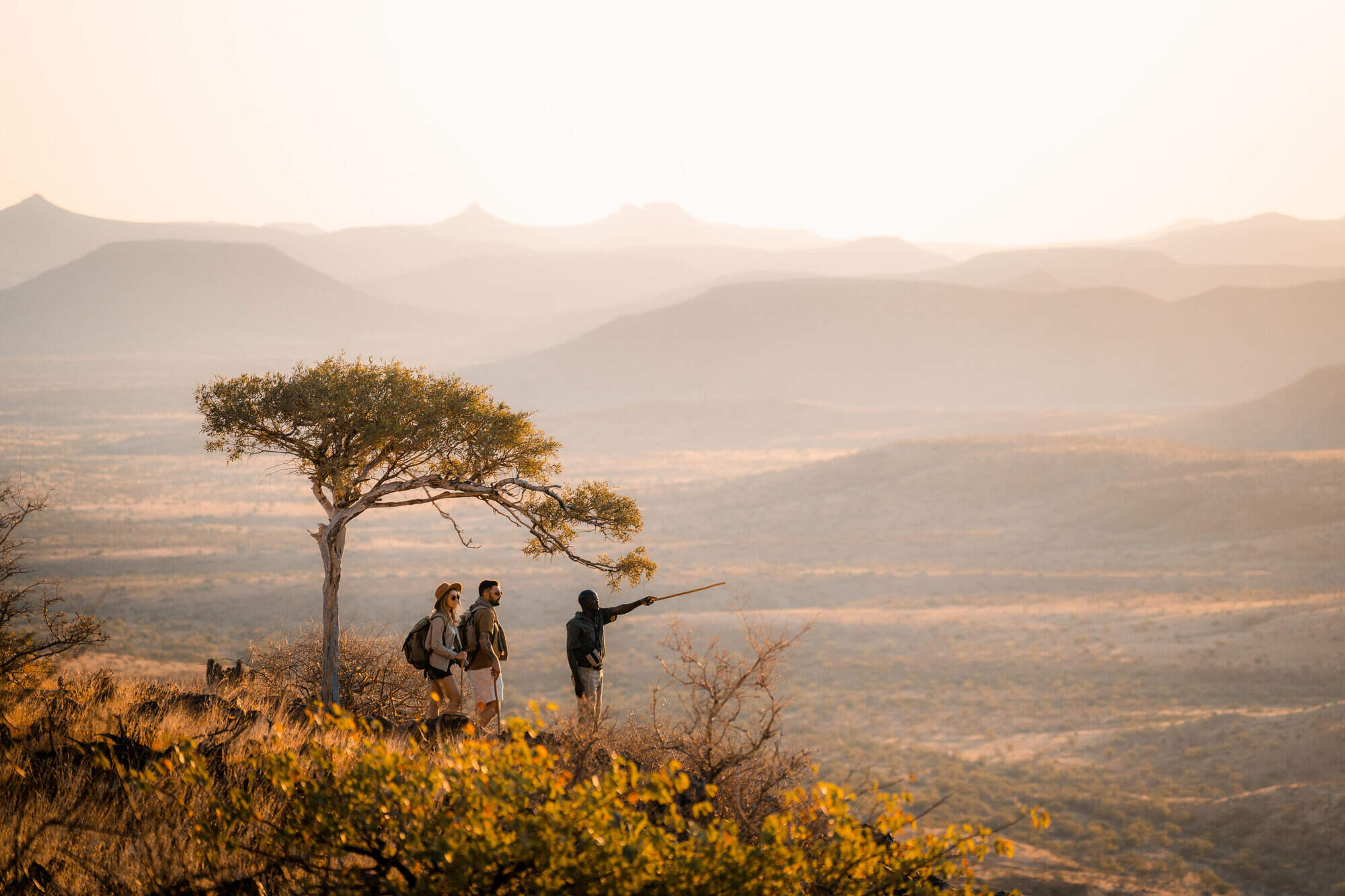
Etendeka Hiking Trail
The Etendeka Walking Trail promises to offer a back-to-basics walking and camping experience in one of Namibia's most remote and untouched wilderness areas.
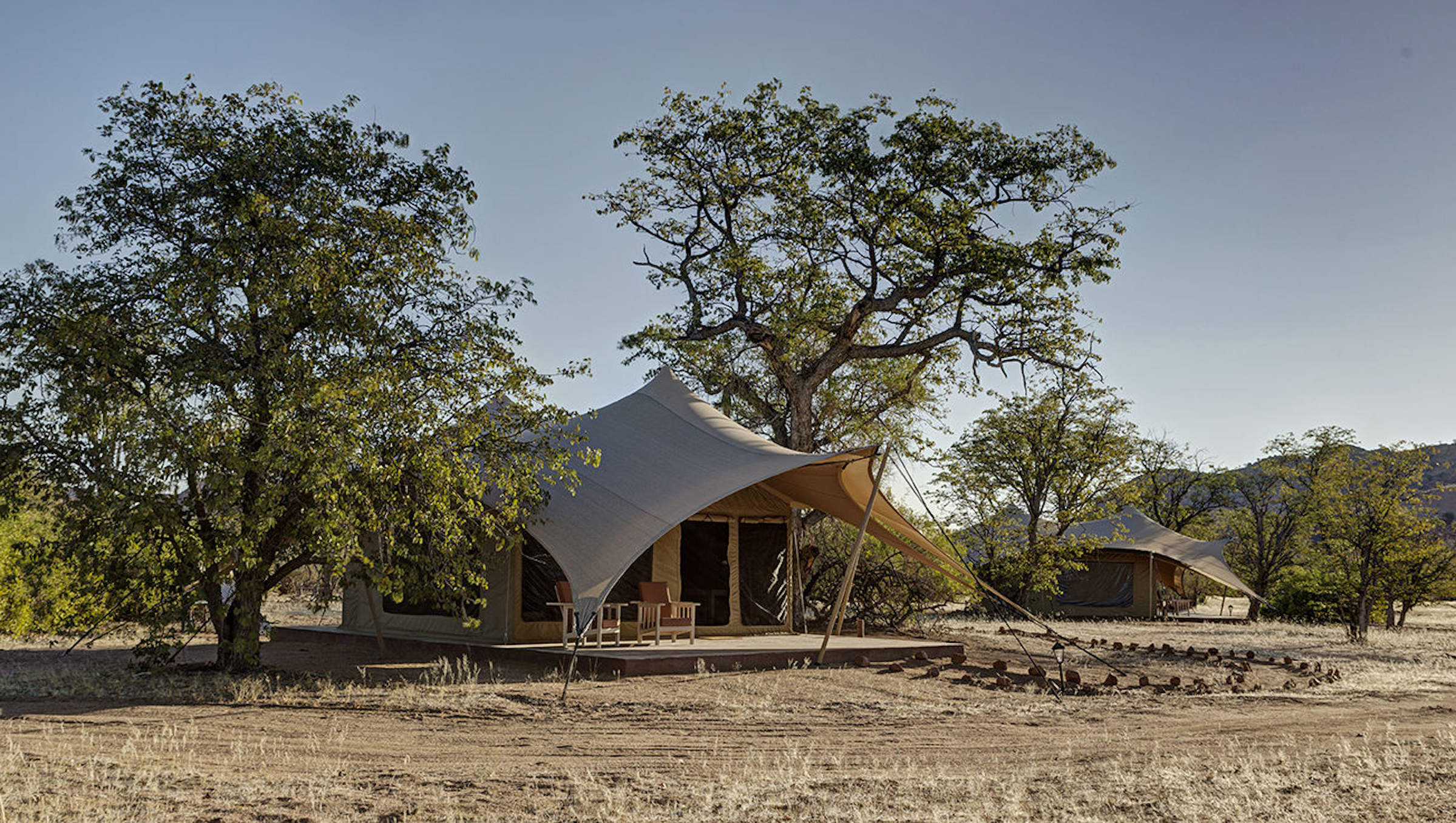
Malansrus Camp
Within easy reach of Twyfelfontein, Malansrus offers a simple but comfortable base for visits to the rock engravings or seek out desert-adapted elephants.
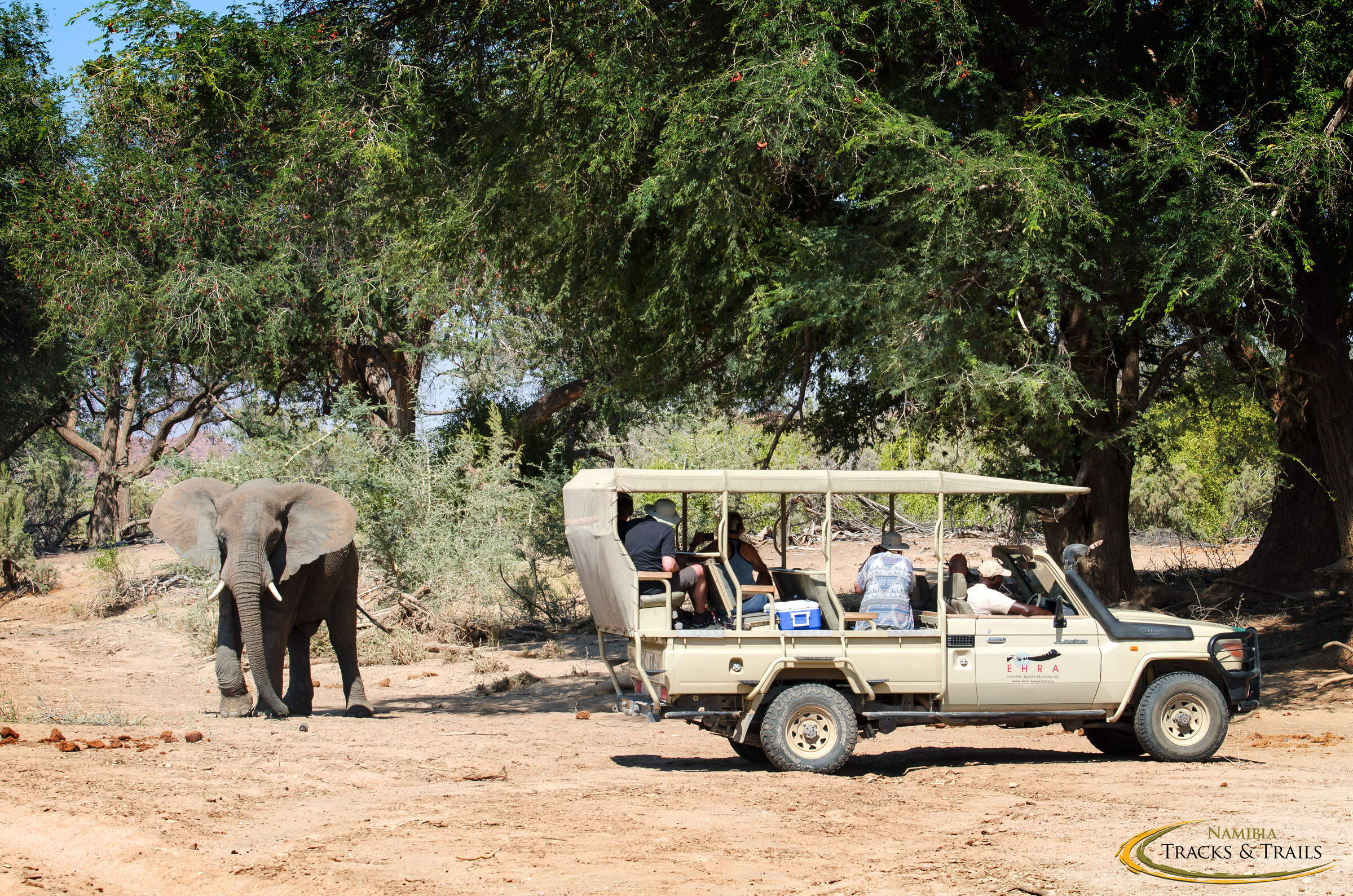
Ozondjou Trails
The simple Ozondjou Trails gives a unique perspective on living with Damaraland’s desert-adapted elephants and how tourism is key to protecting them and the livelihood of the people.
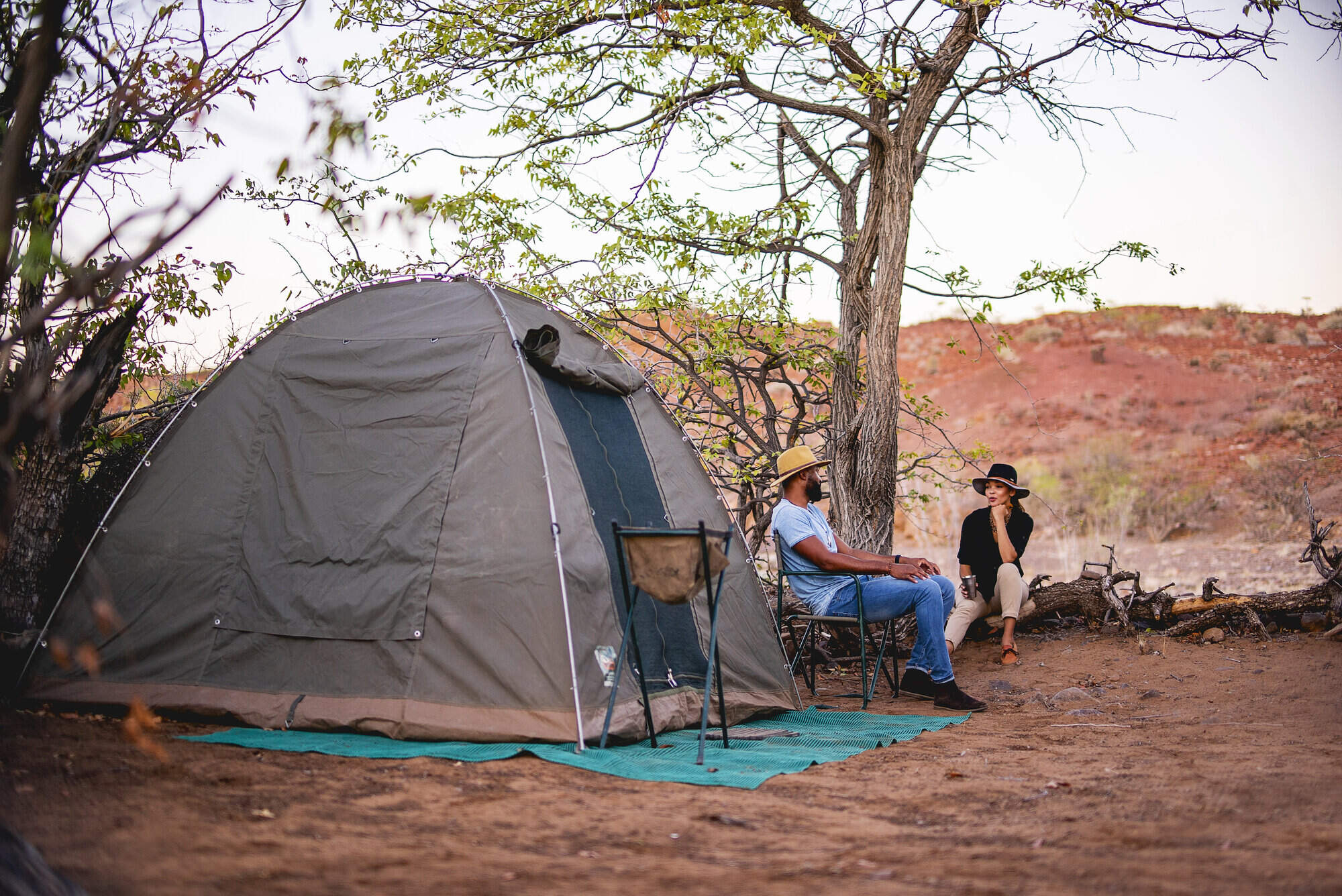
Palmwag Sleep-out
Palmwag Sleep-out is a simple camping experience and a great way to enjoy the remote beauty of the vast Palmwag Concession
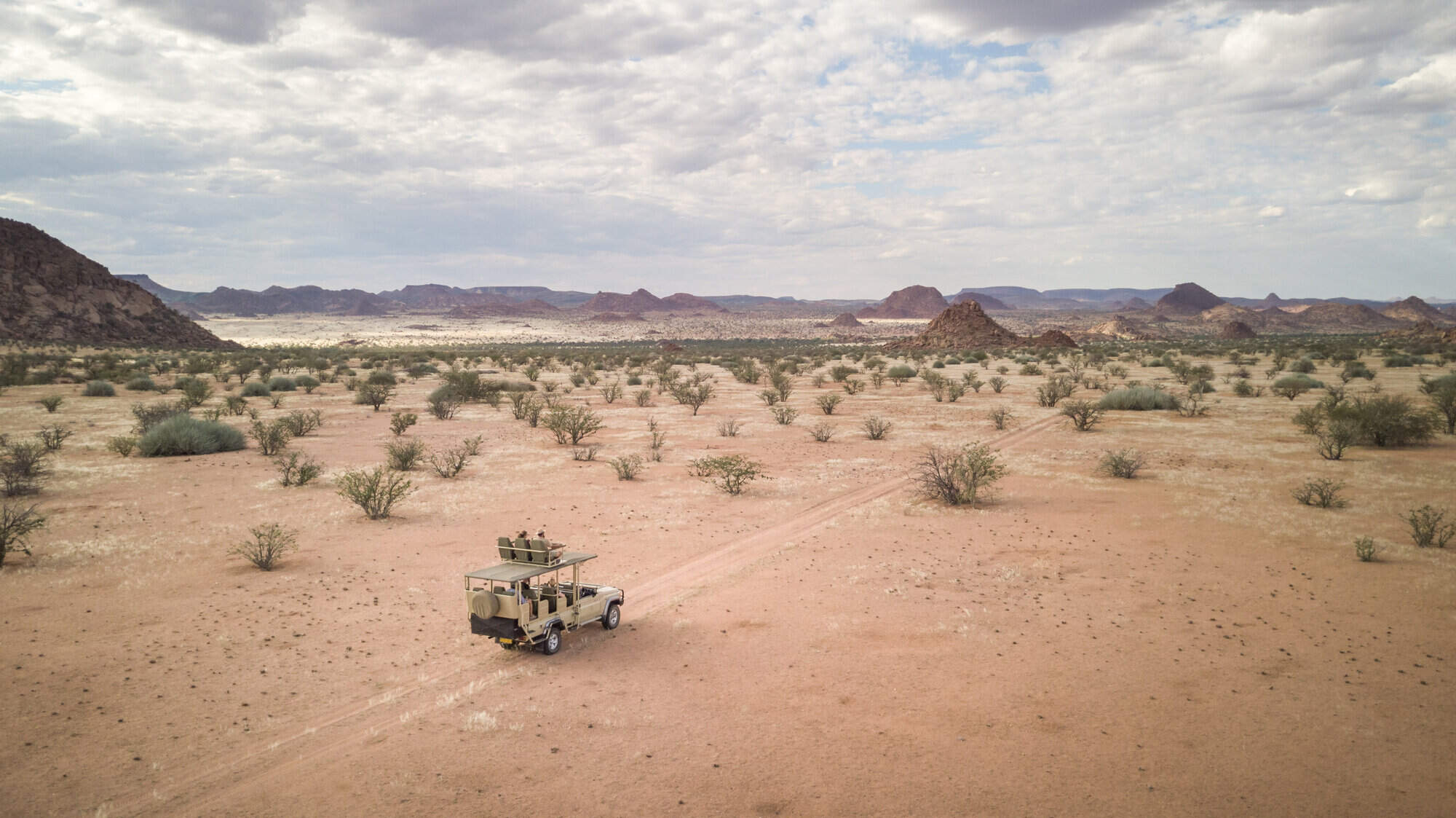
Camp Doros
Small, intimate and with excellent eco-credentials, Camp Doros is set above an ephemeral river within a remote community concession of Damaraland.
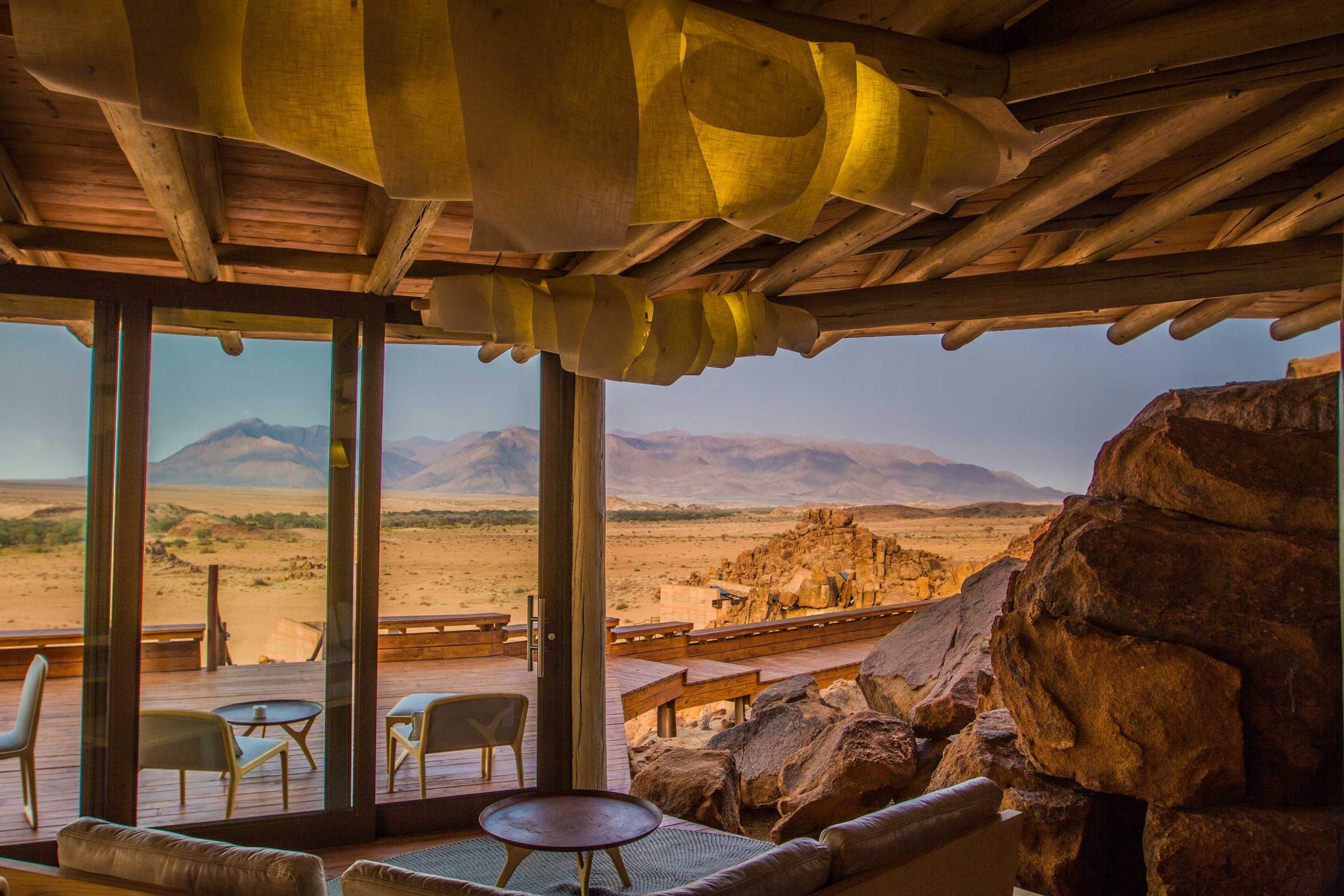
Sorris Sorris Lodge
Overlooking the Brandberg Massif, Sorris Sorris is probably the most luxurious lodge in southern Damaraland.
When to go to Damaraland
Our month by month guide: What it's like to visit Etendeka Camp in Damaraland
Jan
Feb
Mar
Apr
May
Jun
Jul
Aug
Sep
Oct
Nov
Dec
Damaraland in January
In Damaraland, January marks the start of the rainy season. The rains, though often light and localised, bring life to the desert landscape.
At Twyfelfontein, the rock engravings glisten after sporadic showers. Some days are clear and hot, with temperatures around 30°C/86°F, while others see dramatic thunderstorms. These can create flash floods in ephemeral riverbeds like the Ugab, temporarily transforming the arid terrain. The greening landscape provides a refreshing backdrop for the ancient rock art at Brandberg Mountain.
Many birds in the region are in full breeding plumage, with migrant species adding to the variety. Wildlife, including the desert-adapted elephants, disperses across the rejuvenated landscape, making sightings more challenging, but rewarding. The Damara Living Museum offers insights into how local communities adapt to these seasonal changes.
- Variable weather: hot, dry or humid with rain
- Occasional localised thunderstorms
- Wildlife dispersed, harder to spot
- Stark mountains against atmospheric skies
- Few tourists, low rates at accommodations
Our view
This is not a great time to visit
Weather in January
Damaraland in February
February is typically the wettest month in Damaraland, though rainfall remains patchy across this predominantly arid region.
The Spitzkoppe granite peaks against thunderous, atmospheric skies create dramatic vistas for photographers. Some days are clear and hot, while others see afternoon thunderstorms that briefly but dramatically charge the landscape. These rains can make travel more challenging, especially to remote sites like the Epupa Falls. However, the landscape feels vibrant and alive, with insects and smaller animals more easily spotted, and seasonal flowers blooming. Many birds and animals are raising their young, offering unique wildlife viewing opportunities.
Despite the rains, the rock art at Twyfelfontein and the Petrified Forest remain accessible.
- Hot and humid with occasional rain showers
- Thunderstorms meander over the landscape
- Birdlife spectacular, migrant species present
- Wildlife harder to see, but landscape lush
- Low tourist numbers, great for solitude
Our view
This is not a great time to visit
Weather in February
Damaraland in March
March in Damaraland usually sees the main rains tailing off, though precipitation varies greatly across the region. Many days are clear, with strong sun driving temperatures up, while others may experience light rainfall.
The landscape often appears vivid and green, providing a striking contrast to the bare rocky outcrops of Spitzkoppe and Brandberg. Animals such as springbok and mountain zebra may be finishing raising their young. Small herds of plains game such as these can be more visible against the greener backdrop. The Damara Living Museum showcases how local communities adapt to these seasonal changes. The clearer skies towards the end of the month make for excellent stargazing at lodges where you can move your bed to sleep under the stars.
- Weather becoming drier as month progresses
- Animals looking healthy after months of plenty
- Balmy nights sleeping under star-filled skies
- Migrant birds begin to depart
- Few tourists, rates often low at lodges
Our view
A good time to visit, with pros & cons
Weather in March
Damaraland in April
April in Damaraland is typically dominated by dry weather, with decreasing chances of rain. Temperatures begin to fall, but days remain pleasantly warm. The rains often leave the landscape verdant, creating stunning photo opportunities at sites like the Etendeka Plateau and Klip Valley.
Animals are in fantastic condition, often with fast-growing young in attendance. The desert-adapted elephants may be more easily spotted as they begin to return to the riverbeds to feed on Ana and Camelthorn trees. With dust washed from the atmosphere, photographers can capture clear shots of spectacular landscapes. Stargazers will enjoy increasingly clear night skies. In the Palmwag Concession, water and food remain in plentiful supply, so finding mammals such as black rhino can still be challenging, but worth the effort.
- Cooler nights, days still warm and pleasant
- Landscape still green from recent rains
- Air clear, for crisp photographs
- Wildlife starting to become easier to find
- Easter sees an increase in visitors
Our view
A good time to visit, with pros & cons
Weather in April
Damaraland in May
By May, Damaraland is usually drying out fast. If rains have been good, the land remains green, especially around natural springs found in valleys and craggy rocksides. The air quality and clarity can be amazing, making this an ideal month for photography at sites like Twyfelfontein and along the remote Hoanib riverbed.
Temperatures are moderate, typically warm with crisp, clear mornings and blue skies. Evenings are cool enough to wear an extra layer. Many lodges still charge low season prices, offering good value. The combination of increasingly good wildlife sightings, beautiful landscapes, and crystal-clear air make May one of the best months to visit Damaraland. It's an excellent time to explore the region's geological wonders, such as the ancient Etendeka lava flows.
- Lovely weather: warm days, cool nights
- Landscape drying out, still some greenery
- Clear, sharp colours for photography
- Wildlife more visible along scenic riverbeds
- Low visitor numbers, moderate lodge rates
Our view
A very good time to visit
Weather in May
Damaraland in June
June sees Damaraland dry and clear, with blue, largely cloudless skies. Days are often lovely and warm, but nights can be cold, sometimes below freezing in desert areas.
Visitors should pack warm clothing for early morning nature drives to spot desert-adapted elephants or black rhinos. Most outdoor pools are too cold for swimming, except for the very dedicated. It’s a particularly good climate for walking; either short walks or perhaps a multi-day hike on the Etendeka Plateau.
Historically, June prices have been low, but Damaraland's increasing popularity means many lodges now consider it high season.
- Clear, bright days and cold nights
- Wonderful for stargazing and night walks
- Good wildlife viewing in remote wildernesses
- Hiking comfortable in cooler temperatures
- Moderate lodge rates, increasing bookings
Our view
A very good time to visit
Weather in June
Damaraland in July
July in Damaraland offers fairly warm temperatures above 20°C/68°F in the middle of the day, but often cold nights. Visitors should dress in layers and be prepared for chilly mornings and evenings.
Rain is extremely rare, and clear skies make for great photographs of the sandstone mountains in morning and evening light. As vegetation shrivels, animals gather near food and water sources, making sightings of desert-adapted wildlife more likely. Elephant herds are more regularly seen along dry riverbeds during this period.
Lodges charge high season rates, and many are booked up well in advance, especially during European school holidays.
- Dry days, clear skies, crisp cold nights
- Peak time for wildlife viewing in Damaraland
- Desert-adapted elephants more easily spotted
- Wonderfully cool for day walks and longer hikes
- High season rates, book accommodations early
Our view
A very good time to visit
Weather in July
Damaraland in August
August is the height of Damaraland's winter. Expect cloudless skies and usually warm sun during the day, but nights can drop to freezing in desert areas. Visitors should bring warm clothes for nature drives and walks in chilly mornings and evenings.
The landscape begins to change from green to golden grasses and stark hillsides. Wildlife sticks close to dry river-beds where desert-adapted elephants dig for water, creating waterholes for other animals.
The clear, dry conditions make it an excellent time for hiking and exploring geological features like the Organ Pipes and Burnt Mountain.
August is the most popular time to visit Damaraland, especially for families. Booking well in advance is essential.
- Perfect weather for outdoor activities
- Excellent wildlife viewing opportunities
- Popular time for hiking and tracking rhino on foot
- Good time for cultural experiences at Damara Living Museum
- Peak season, lodges booked up well in advance
Our view
Fantastic: the very best time to visit
Weather in August
Damaraland in September
September in Damaraland brings blue, cloudless skies and fantastic wildlife viewing. Rain is almost unheard of, and as the month progresses, days and nights quickly get warmer. Daily maximums can reach the low 30s Celsius/mid-80s Fahrenheit, though low humidity keeps it comfortable. The air becomes dustier, occasionally affecting visibility for photographers at sites like Twyfelfontein or Brandberg.
In the Palmwag Concession and along the Ugab River, animals congregate around remaining water sources, making September one of the best months for game viewing, especially for desert-adapted elephants and black rhinos, but also desert-adapted lion. It's a popular month for visitors, particularly safari enthusiasts seeking sightings of these unique sub-species.
The Himba at Khowarib provide insights into how local communities adapt to the dry season.
- Warm days, nights getting warmer
- Landscape golden brown, very photogenic
- Prime time for seeing desert-adapted wildlife
- Air can be hazy with dust
- High season rates, book well in advance
Our view
Fantastic: the very best time to visit
Weather in September
Damaraland in October
Damaraland is usually at its hottest and driest in October. Temperatures build throughout the month, with daily highs potentially exceeding 40°C/104°F towards the end. The extreme dryness, though, makes even these high temperatures bearable.
Wildlife watching is at its best, particularly in areas like the remote Palmwag Concession and along the Hoanib River. October is popular among wildlife enthusiasts, as shyer species such as brown hyena and cheetah are more regularly seen. However, dust and occasional smoke may make the air hazy, challenging landscape photographers but creating beautiful sunsets.
Visitor numbers can decrease towards the end of the month, potentially allowing for last-minute bookings at some lodges.
- Hot and dry, true desert conditions
- Wildlife congregates at remaining water
- Excellent month for photographing sunsets
- Peak tourist time, expect higher rates
- Unusual species like brown hyena more regularly seen
Our view
A very good time to visit
Weather in October
Damaraland in November
November in Damaraland is unpredictable; sometimes dry and hot, sometimes cloudier and cooler. Typically, mornings are hot and clear, with clouds gathering from the afternoon. Humidity builds, occasionally resulting in spectacular thunderstorms with convection rainfall in late afternoons. These storms are usually localised and may not reach desert areas.
Places receiving good rain, like parts of the Palmwag Concession, quickly turn green, softening the landscape. Many mammals give birth, offering unique wildlife viewing opportunities. Once rains settle in waterholes, wildlife disperses in search of food, making game viewing more challenging. However, this is an excellent time for birdwatchers, with migrant species arriving and taking on breeding plumage.
The rock art at Twyfelfontein and Brandberg can be particularly striking after light rains.
- Variable weather, possibility of rain
- New growth if rains arrive, landscape greens
- Wildlife viewing still good, with babies often born
- Shoulder season rates offer better value
- Birdlife increases with migrant arrivals
Our view
A good time to visit, with pros & cons
Weather in November
Damaraland in December
December is often a dry month between November’s short rains and the main rains in January, and is one of its hottest months. Occasional short, often spectacular thunderstorms are often highly localised and generally welcomed, clearing the air of dust and allowing plant life to flourish. This creates a green carpet across the usually arid landscape, providing food for young animals.
Wildlife, including the desert-adapted elephants, disperses widely as food is more plentiful, making game viewing in areas like the Palmwag Concession more challenging. But sightings in early December can be enjoyed and photographed at leisure often with few or no other viewers. Many birds are breeding, sporting their most colorful plumage.
Christmas and New Year fall within local summer holidays, so accommodation options can be surprisingly busy, especially in cooler areas near the coast.
- Hot days, possibility of refreshing showers
- Landscape may become green with early rains
- Good time for seeing young animals
- Desert-adapted species less concentrated
- Holiday season brings more visitors
Our view
This is not a great time to visit
Weather in December

Looking for inspiration on where to travel next?
Visit our trip chooser to explore your options and find inspiration for your perfect African adventure
Inspire me